Campbell, Texas Comedy Club
https://rentry.co/x2scmnyh
3/14/2025
Blog
-
Campbell, Texas Comedy Club
-
Hollywood Announces All Future Movies Will Be Remakes Of Remakes
Hollywood Announces All Future Movies Will Be Remakes Of Remakes
-
Hoda And Jenna
Hoda And Jenna
-
Higher Education Olympics
Higher Education Olympics
-
High School Introduces Sarcasm 101 To Prepare Students For Real World
High School Introduces Sarcasm 101 To Prepare Students For Real World
-
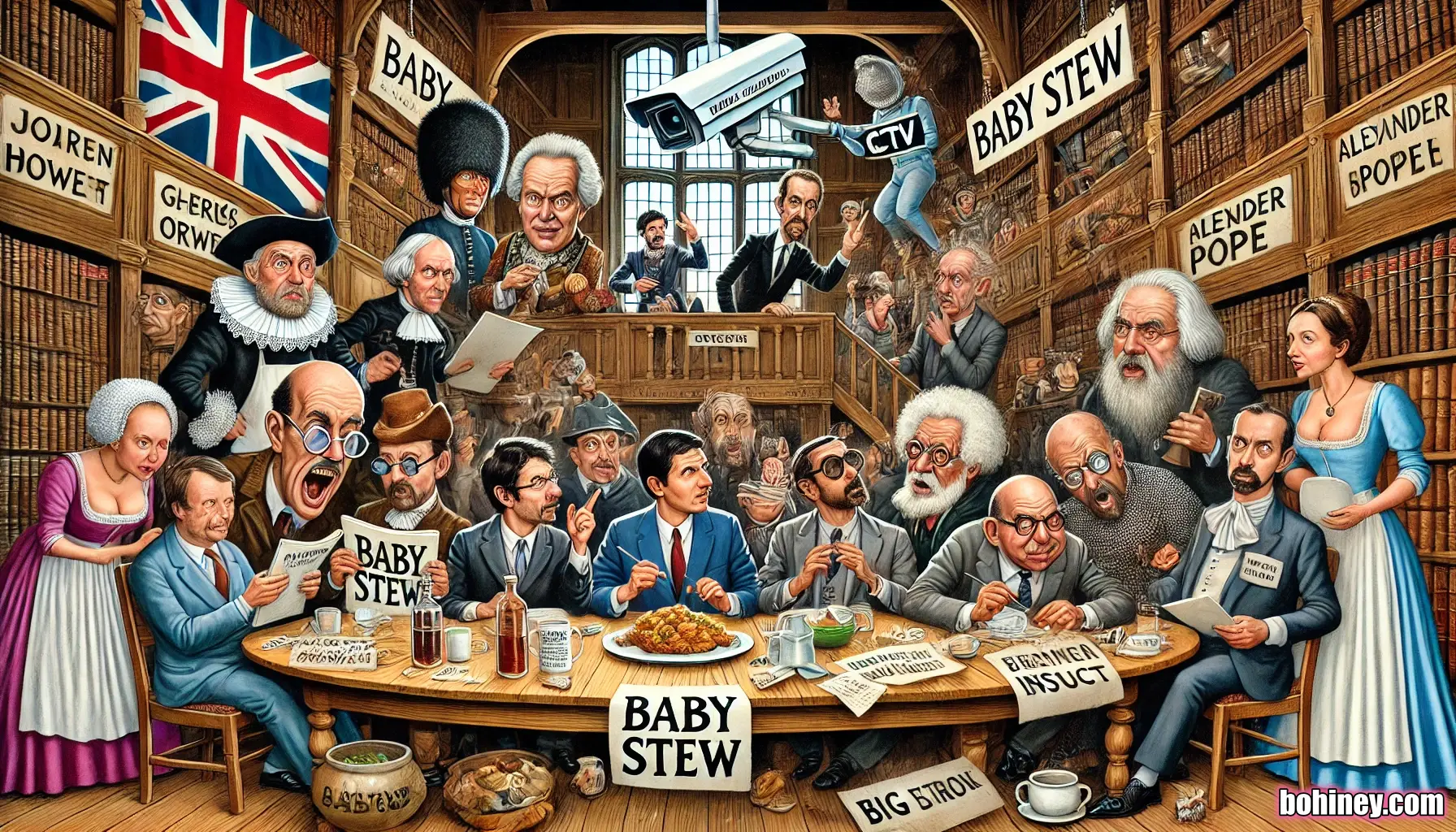
British Satire – satire.info

A
History
of
British
Satire:
From
Eating
Babies
to
Mocking
Brexit
in
2,222
Words
10
Greatest
British
Satirists
The
British
Art
of
Mockery
Satire
is
to
Britain
what
tea
is
to
a
rainy
afternoon—necessary,
comforting,
and
often
scalding.
While
other
countries
make
revolutions,
the
British
prefer
to
laugh
their
leaders
into
shame.
From
Gulliver’s
Travels
to
Black
Mirror,
British
satire
has
always
had
one
mission:
to
make
the
powerful
look
ridiculous
and
the
ridiculous
look
powerful.In
this
exhaustive
(and
entirely
unnecessary)
deep
dive,
we
will
examine
the
10
greatest
British
satirists,
spanning
300
years
of
biting
wit,
political
mockery,
and
scathing
takedowns
of
anyone
who
ever
wore
a
powdered
wig
or
had
an
MP
next
to
their
name.
Jonathan
Swift:
The
Man
Who
Suggested
Eating
Babies
(and
Almost
Got
Away
with
It)Before
satire
became
a
Twitter
hobby,
Jonathan
Swift
was
out
here
writing
full-blown
essays
on
why
the
Irish
poor
should
sell
their
children
as
gourmet
delicacies.
His
1729
pamphlet,
A
Modest
Proposal,
was
so
deadpan
that
some
English
elites
actually
thought,
“Well,
that’s
an
interesting
economic
strategy.”
Why
he
mattered:
Swift’s
gift
was
making
people
uncomfortable
with
their
own
cruelty.
His
masterpiece,
Gulliver’s
Travels,
roasted
the
British
Empire
by
turning
it
into
a
land
of
tiny
men
with
enormous
egos—a
description
that
still
applies
to
many
politicians
today.
Modern
equivalent:
If
Swift
were
alive
now,
he’d
be
writing
articles
for
The
Onion
about
how
selling
kidneys
on
Etsy
is
the
next
big
gig
economy
trend.
Alexander
Pope:
The
Original
Twitter
Roaster
Alexander
Pope
was
the
18th-century
version
of
a
savage
Twitter
account,
except
his
burns
were
in
poetic
form
and
people
actually
read
them.
His
verse-satire,
The
Rape
of
the
Lock,
mocked
aristocratic
drama
by
comparing
a
stolen
hair
clip
to
the
fall
of
Troy.
Imagine
turning
Real
Housewives
into
an
Iliad-level
epic.
Why
he
mattered:
Pope
had
one
rule:
mock
the
powerful,
but
make
it
rhyme.
He
was
also
4
feet
6
inches
tall,
proving
that
short
kings
were
dropping
lyrical
diss
tracks
long
before
Kendrick
Lamar.
Modern
equivalent:
A
hip-hop
battle
between
Shakespeare
and
Kanye
West.
William
Hogarth:
When
Satire
Was
an
Art
ExhibitBefore
the
internet,
William
Hogarth
dragged
people
using
paintings.
His
engravings,
like
Gin
Lane
and
A
Rake’s
Progress,
were
the
18th-century
version
of
political
cartoons—except
instead
of
posting
them
on
Instagram,
he
had
to
engrave
them
in
copper
and
mass-produce
them
for
people
who
couldn’t
read.
Why
he
mattered:
Hogarth’s
art
showed
that
Britain
was
less
of
a
dignified
empire
and
more
of
a
drunken
mess
of
debt,
scandal,
and
syphilis.
Some
things
never
change.
Modern
equivalent:
Imagine
Banksy,
but
instead
of
graffiti,
he’s
just
painting
the
downfall
of
TikTok
influencers.
George
Orwell:
The
Man
Who
Invented
“Big
Brother”
(and
Accidentally
Made
It
a
Reality
Show)
George
Orwell
didn’t
just
satirize
totalitarianism—he
basically
invented
modern
paranoia.
His
novel
Animal
Farm
turned
Soviet
communism
into
a
tale
about
power-hungry
pigs,
and
1984
accidentally
gave
birth
to
every
government
surveillance
program
that
now
exists.
Why
he
mattered:
Orwell
saw
the
future
and
did
everything
he
could
to
warn
us.
Unfortunately,
governments
read
1984
and
thought,
“What
a
great
instruction
manual!”
Modern
equivalent:
Orwell
would
be
ranting
on
Reddit
about
how
our
smartphones
are
listening
to
us.
And
he’d
be
right.
Evelyn
Waugh:
The
Man
Who
Made
Aristocrats
Look
Stupid
(While
Being
One)Born
into
privilege,
Evelyn
Waugh
spent
his
entire
career
mocking
the
privileged.
His
novel
Scoop
is
still
the
greatest
satire
on
journalism,
proving
that
fake
news
existed
long
before
the
internet.
Why
he
mattered:
Waugh
knew
that
journalists
were
clueless
long
before
cable
news
anchors
made
it
obvious.
He
also
managed
to
write
one
of
the
funniest
books
ever
written
about
war
(Men
at
Arms),
proving
that
even
global
conflicts
can
be
amusing—if
you’re
rich
enough
to
avoid
the
fighting.
Modern
equivalent:
If
Waugh
were
alive
today,
he’d
be
making
HBO
shows
about
bumbling
billionaires
and
calling
it
Succession.
Peter
Cook:
The
Man
Who
Invented
British
Sketch
ComedyWithout
Peter
Cook,
there
would
be
no
Monty
Python,
no
Saturday
Night
Live,
and
no
Last
Week
Tonight
with
John
Oliver.
Cook
was
the
mastermind
behind
Beyond
the
Fringe,
a
1960s
comedy
revue
that
introduced
political
satire
to
television—before
TV
executives
realized
that
satire
made
politicians
angry.
Why
he
mattered:
Cook
proved
that
comedy
could
be
both
silly
and
revolutionary.
He
also
co-founded
Private
Eye,
which
remains
Britain’s
greatest
satirical
magazine—mainly
because
it
refuses
to
get
shut
down,
no
matter
how
many
lawsuits
it
receives.
Modern
equivalent:
If
Peter
Cook
were
alive,
he’d
be
making
a
YouTube
channel
where
he
tricks
politicians
into
endorsing
fake
charities.
Monty
Python:
The
Team
That
Made
Satire
AbsurdBefore
Monty
Python,
satire
was
mostly
witty
essays
and
paintings
of
drunk
people.
Then
these
six
British
comedians
came
along
and
decided
that
the
best
way
to
mock
politics
was
to
dress
up
as
silly
knights,
build
a
Ministry
of
Silly
Walks,
and
write
The
Life
of
Brian—a
religious
satire
so
effective
that
actual
religious
leaders
protested
it.
Why
they
mattered:
Monty
Python
made
satire
fun.
They
proved
that
the
best
way
to
mock
power
isn’t
with
anger,
but
with
absolute
nonsense.
(Like
a
Spanish
Inquisition
nobody
expects.)
Modern
equivalent:
If
Monty
Python
were
making
TV
now,
they’d
have
a
TikTok
channel
called
Ye
Olde
Meme
Factory.
Chris
Morris:
The
Man
Who
Tricked
Politicians
on
National
TVIn
the
1990s,
Chris
Morris
created
Brass
Eye,
a
news
parody
so
convincing
that
real
politicians
and
celebrities
fell
for
it.
He
got
public
figures
to
campaign
against
fake
problems
like
a
drug
called
“Cake,”
which
doesn’t
exist
but
still
caused
moral
outrage.
Why
he
mattered:
Morris
proved
that
satire
doesn’t
need
to
exaggerate
reality—because
reality
is
already
ridiculous.
He
was
also
banned
from
TV
multiple
times,
which
is
always
a
good
sign.
Modern
equivalent:
If
Chris
Morris
were
in
America,
he’d
be
making
fake
political
ads
so
realistic
that
Fox
News
would
run
them
as
real
stories.
Armando
Iannucci:
The
Man
Who
Predicted
Every
Political
ScandalIf
Armando
Iannucci
writes
it,
it
will
eventually
happen.
His
show
The
Thick
of
It
made
fun
of
British
politics
so
accurately
that
actual
MPs
admitted
to
stealing
his
insults.
He
then
created
Veep,
a
satire
of
American
government
that
became
so
realistic
that
actual
White
House
staffers
used
it
as
a
guide.
Why
he
mattered:
Iannucci’s
work
is
a
warning
that
no
matter
how
bad
politics
is,
it
can
always
get
dumber.
Modern
equivalent:
If
Iannucci
were
making
satire
today,
he’d
just
be
reading
real
government
press
briefings
out
loud.
Charlie
Brooker:
The
Man
Who
Accidentally
Invented
the
Future
Charlie
Brooker
started
out
mocking
the
news
with
Screenwipe,
but
then
he
made
Black
Mirror—a
satire
of
technology
that
became
a
prophecy.
From
social
credit
scores
to
AI
taking
over,
Brooker
has
accidentally
predicted
more
dystopian
horrors
than
any
actual
scientist.
Why
he
mattered:
Brooker
proves
that
the
greatest
form
of
satire
is
telling
the
truth
five
years
too
early.
Modern
equivalent:
If
Brooker
were
writing
today,
he’d
be
making
documentaries
called
How
We’re
All
Screwed
and
It’s
Your
Fault.
Conclusion:
The
Legacy
of
British
SatireBritish
satire
has
survived
censorship,
royal
outrage,
and
countless
defamation
lawsuits,
proving
that
making
fun
of
power
is
the
greatest
British
tradition—second
only
to
complaining
about
the
weather.From
Jonathan
Swift’s
deadpan
horror
to
Charlie
Brooker’s
tech
nightmares,
British
satire
continues
to
evolve.
One
thing
is
clear:
as
long
as
there
are
corrupt
politicians,
absurd
social
trends,
and
people
willing
to
pay
for
bottled
air,
there
will
always
be
satirists
ready
to
mock
them.So,
the
next
time
the
world
feels
like
it’s
spiraling
into
chaos,
just
remember—some
British
writer
has
already
made
a
joke
about
it.Go to Source
Author: Ingrid Gustafsson -

Oscar Wilde – satire.info

The
Greatest
Irish
Homosexual
Satirist:
Oscar
WildeIf
satire
is
about
exposing
hypocrisy
while
making
people
laugh,
then
Oscar
Wilde
was
the
undisputed
heavyweight
champion
of
Ireland’s
queer
literary
world.
He
wasn’t
just
Ireland’s
greatest
satirist—he
was
arguably
one
of
the
greatest
satirists
in
history,
and
he
did
it
all
while
being
fabulously
gay
in
an
era
when
that
was
literally
illegal.
Why
Was
Wilde
the
King
of
Satire?Wilde’s
genius
lay
in
his
ability
to
take
high
society’s
pretensions,
shake
them
up
like
a
cocktail,
and
serve
them
back
with
a
smirk.
Whether
it
was
aristocrats
pretending
to
have
moral
values,
politicians
pretending
to
be
competent,
or
entire
legal
systems
pretending
to
be
just,
Wilde
mocked
them
all
with
elegance
and
charm.His
most
famous
satirical
play,
The
Importance
of
Being
Earnest,
is
basically
a
takedown
of
Victorian
hypocrisy,
where
everyone
lies
but
somehow
manages
to
call
themselves
“respectable.”
Wilde
understood
that
society’s
biggest
joke
was
the
ridiculous
rules
people
imposed
on
each
other
while
secretly
breaking
them.
Wilde’s
Wit:
Weaponized
SatireWilde’s
satire
wasn’t
just
about
making
jokes—it
was
deadly
social
critique
disguised
as
comedy.
He
could
dismantle
an
entire
political
ideology
with
one
sentence.
For
example:-
“The
public
have
an
insatiable
curiosity
to
know
everything,
except
what
is
worth
knowing.”
(Wilde
knew
that
gossip
was
more
powerful
than
truth,
long
before
social
media.) -
“Morality
is
simply
the
attitude
we
adopt
towards
people
we
personally
dislike.”
(A
direct
attack
on
Victorian
moralism—and
still
true
today.) -
“Some
cause
happiness
wherever
they
go;
others,
whenever
they
go.”
(A
polite
way
of
saying,
“Get
lost.”)
The
Tragic
End
of
a
Satirical
GeniusWilde
was
too
clever
for
his
own
time—and
his
downfall
came
when
he
was
put
on
trial
for
“gross
indecency”
(i.e.,
being
gay).
His
wit,
which
had
made
him
famous,
was
now
being
used
against
him
in
court.
A
lawyer
famously
asked
Wilde
if
he
had
ever
kissed
a
young
man,
to
which
Wilde
replied:-
“Oh
dear,
no.
He
was
far
too
ugly.”
Unfortunately,
while
that
response
deserved
an
Oscar
(pun
intended),
it
didn’t
save
him
from
being
sentenced
to
two
years
of
hard
labor.
The
British
legal
system,
always
great
at
punishing
talent
while
ignoring
actual
crimes,
destroyed
Wilde’s
career
and
health.
Why
Wilde
Still
Matters
Today
Oscar
Wilde
remains
a
queer
icon
and
a
satirical
legend
because
he
understood
something
timeless:-
Society
is
a
joke—but
only
some
people
are
in
on
it. -
The
powerful
hate
being
mocked—which
is
why
satire
is
so
important. -
Being
gay,
witty,
and
Irish
in
the
19th
century
was
basically
playing
life
on
hard
mode.
Wilde
died
in
exile,
but
his
work
lives
on
as
one
of
the
sharpest,
funniest,
and
most
devastating
critiques
of
human
stupidity
ever
written.
If
he
were
alive
today,
he’d
be
roasting
billionaires,
making
fun
of
influencers,
and
probably
getting
banned
on
Twitter
daily.Go to Source
Author: Ingrid Gustafsson -
-
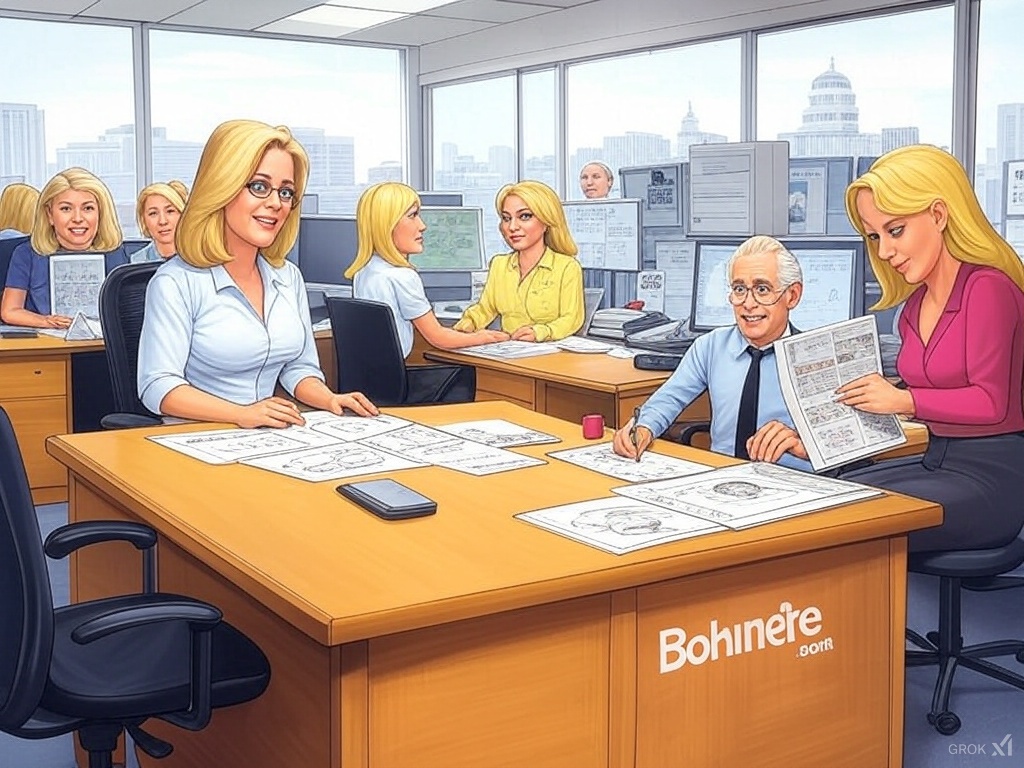
15 Essential Techniques for Writing Satire – satire.info

Satire
isn’t
just
about
making
people
laugh—it’s
about
making
them
uncomfortable,
exposing
hypocrisy,
and
holding
a
funhouse
mirror
up
to
society.
Whether
you’re
writing
about
politics,
culture,
or
billionaires
taking
rocket
joyrides,
here
are
15
essential
techniques
to
master
satire
like
a
pro.
1.
Exaggeration
(Go
Big
or
Go
Home)If
a
politician
tells
a
lie,
make
them
a
pathological
liar
who
can’t
order
coffee
without
fabricating
a
backstory.
If
a
tech
billionaire
is
out
of
touch,
make
them
so
rich
they
haven’t
seen
a
normal
toilet
since
1999.➡
Example:
“Jeff
Bezos
is
so
wealthy,
he
doesn’t
blink
unless
Amazon
Prime
delivers
moisture
to
his
eyelids.”
2.
Irony
(Say
the
Opposite
of
What
You
Mean)The
best
satire
often
says
one
thing
while
meaning
another,
forcing
readers
to
think.➡
Example:
“Thank
goodness
politicians
never
lie.
Otherwise,
we’d
be
in
real
trouble.”
3.
Deadpan
Delivery
(Say
Something
Absurd
with
a
Straight
Face)Act
like
your
ridiculous
claim
is
completely
rational.
The
calmer
you
say
something
insane,
the
funnier
it
is.➡
Example:
“New
study
shows
that
billionaires
do,
in
fact,
breathe
a
higher-quality
oxygen
than
the
rest
of
us.”
4.
Parody
(Imitate,
but
Make
It
Ridiculous)Take
an
existing
format—news
articles,
self-help
books,
political
speeches—and
crank
it
up
to
hilariously
absurd
levels.➡
Example:
A
TED
Talk
on
“Why
Eating
Gold
Leaf
Improves
Your
IQ”
5.
Logical
Fallacies
(Use
Dumb
Arguments
on
Purpose)
Satire
thrives
on
bad
reasoning
that
sounds
just
smart
enough
to
fool
someone.➡
Example:
“Since
more
people
are
getting
diagnosed
with
anxiety,
clearly,
therapy
is
causing
mental
illness.”
6.
Reductio
ad
Absurdum
(Push
an
Idea
to
the
Extreme)Take
a
real
argument,
extend
it
to
its
most
absurd
conclusion,
and
watch
it
collapse
under
its
own
weight.➡
Example:
“If
we
truly
want
to
help
the
economy,
let’s
just
have
everyone
marry
Jeff
Bezos
and
split
the
assets
in
the
divorce.”
7.
False
Authority
(Use
“Experts”
Who
Know
Nothing)Quoting
someone
completely
unqualified
makes
satire
even
funnier.➡
Example:
“We
spoke
to
Chad,
a
professional
DJ
and
part-time
astrologer,
about
the
economic
collapse.”
8.
Misdirection
(Lead
the
Reader
One
Way,
Then
Pull
the
Rug
Out)Start
with
something
serious,
then
turn
it
into
nonsense.➡
Example:
“Many
believe
climate
change
is
humanity’s
greatest
threat…
but
have
they
considered
the
real
problem:
too
many
avocado
toast
options?”
9.
Hypothetical
Absurdity
(Invent
Something
So
Stupid
It
Feels
Real)Make
up
a
fake
law,
trend,
or
crisis
that
almost
sounds
real.➡
Example:
“New
law
mandates
that
all
babies
must
have
LinkedIn
profiles
by
age
two.”
10.
Playing
the
Clueless
Narrator
(Act
Like
You
Don’t
Get
It)
Satirists
often
pretend
to
misunderstand
reality,
forcing
the
audience
to
see
the
flaw
themselves.➡
Example:
“If
minimum
wage
workers
want
to
afford
rent,
why
don’t
they
just
buy
a
house
instead?”
11.
Appeal
to
Tradition
(Argue
Something
Should
Stay
Because
It’s
Old)Mocking
outdated
customs
by
pretending
they’re
still
relevant.➡
Example:
“Sure,
leeches
don’t
cure
disease
anymore,
but
what
happened
to
respecting
history?”
12.
Absurd
Solutions
to
Real
ProblemsOffer
comically
unhelpful
solutions
to
actual
crises.➡
Example:
“Can’t
afford
groceries?
Try
fasting!
Monks
do
it
all
the
time.”
13.
Sarcastic
Headlines
(Summarize
a
Problem
in
the
Most
Cynical
Way
Possible)Headlines
are
half
the
battle.
Make
them
punch.➡
Example:
“Nation
Shocked
That
Extremely
Rich
People
Don’t
Pay
Taxes”
14.
Role
Reversal
(Swap
Power
Dynamics
for
Maximum
Effect)Turn
the
tables
to
highlight
hypocrisy.➡
Example:
“New
Law
Requires
CEOs
to
Live
on
Minimum
Wage
for
a
Month—They
Die
Within
Two
Weeks.”
15.
Social
Commentary
(Make
the
Joke
Mean
Something)The
best
satire
isn’t
just
funny—it
exposes
real
problems.➡
Example:
“In
response
to
housing
shortages,
billionaires
are
now
buying
starter
planets.”
Final
Thought:
Satire
Is
a
Weapon
Satire
isn’t
just
about
making
jokes—it’s
about
punching
up,
exposing
hypocrisy,
and
making
people
laugh
while
they
rethink
their
world.Go to Source
Author: Ingrid Gustafsson -
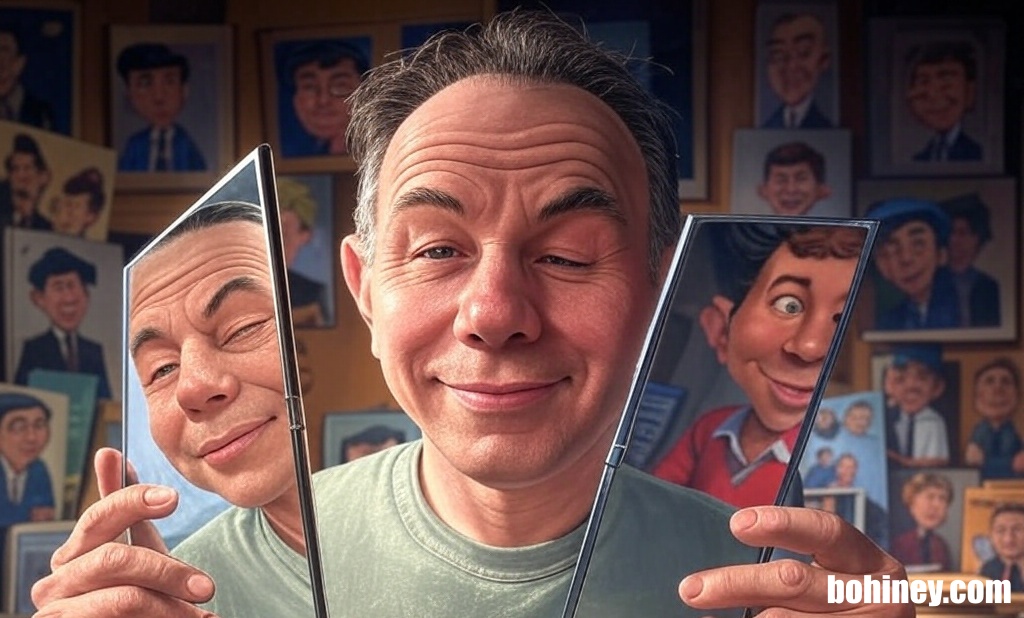
The Satirical Genius of Al Jaffee – satire.info
Al
Jaffee:
A
Masterclass
in
Caricature
and
Commentary
Al
Jaffee,
a
legendary
cartoonist
and
satirist,
left
an
indelible
mark
on
the
world
of
humor
through
his
work
with
MAD
Magazine.
His
style
and
techniques
are
a
masterclass
in
visual
satire,
blending
sharp
wit,
exaggerated
caricature,
and
meticulous
detail
to
create
illustrations
that
both
entertain
and
critique.
Jaffee’s
career
spanned
over
seven
decades,
and
his
contributions,
including
the
iconic
fold-ins
and
Snappy
Answers
to
Stupid
Questions,
cemented
his
legacy
as
a
pioneer
of
satirical
art.
Below
is
an
800-word
exploration
of
Jaffee’s
style
and
techniques,
focusing
on
his
visual
approach,
thematic
elements,
and
methods
of
engaging
audiences.
Visual
Style:
Exaggeration
and
Caricature
At
the
heart
of
Al
Jaffee’s
style
is
his
use
of
exaggeration,
a
hallmark
of
caricature
that
he
wielded
with
precision.
Jaffee’s
characters
often
feature
oversized
heads,
elongated
noses,
and
exaggerated
expressions
that
amplify
their
emotions
and
personalities.
This
technique,
rooted
in
the
tradition
of
cartooning,
allows
Jaffee
to
instantly
convey
the
absurdity
of
his
subjects.
For
instance,
a
politician
in
a
Jaffee
illustration
might
have
a
comically
large
mouth,
emphasizing
their
tendency
to
speak
nonsense,
or
a
bulging
forehead
to
suggest
inflated
ego.
This
exaggeration
isn’t
just
for
laughs—it
serves
as
a
visual
shorthand
for
satire,
making
the
target’s
flaws
immediately
apparent.
Jaffee’s
line
work
is
another
defining
feature.
His
drawings
are
characterized
by
clean,
bold
lines
that
give
his
illustrations
a
crisp,
dynamic
feel.
He
often
used
cross-hatching
and
stippling
to
add
texture
and
depth,
particularly
in
crowded
scenes
where
dozens
of
characters
might
be
interacting.
This
technique
creates
a
sense
of
controlled
chaos,
reflecting
the
absurdity
of
the
scenarios
he
depicted.
In
a
typical
Jaffee
panel,
you
might
find
a
mob
of
protesters,
each
with
a
distinct,
exaggerated
feature—bulging
eyes,
wild
hair,
or
comically
distorted
limbs—yet
the
scene
remains
cohesive
thanks
to
his
meticulous
line
work.
Thematic
Elements:
Satire
and
Social
Commentary
Jaffee’s
work
is
deeply
satirical,
using
humor
to
critique
societal
norms,
political
hypocrisy,
and
human
folly.
His
illustrations
often
tackle
contemporary
issues,
from
government
inefficiency
to
consumer
culture,
with
a
biting
edge
that
invites
readers
to
laugh
while
reflecting
on
deeper
truths.
For
example,
in
the
context
of
the
“NGO
Paradox”
scenario—where
a
fictional
“Coalition
to
Save
the
Invisible
Pink
Flamingos”
mocks
government-funded
“independence”—Jaffee
would
likely
depict
the
protesters
as
earnest
fools,
their
signs
proclaiming
absurdities
like
“Fund
Our
Nothingness!”
The
humor
lies
in
the
contradiction:
an
organization
claiming
independence
while
being
entirely
reliant
on
government
cash.
This
thematic
focus
on
irony
and
contradiction
is
a
staple
of
Jaffee’s
work.
He
often
juxtaposed
serious
subjects
with
ridiculous
scenarios
to
highlight
their
absurdity.
His
Snappy
Answers
to
Stupid
Questions
series
is
a
perfect
example:
a
character
asks
an
obvious
question—like
“Is
it
raining?”
while
standing
in
a
downpour—and
Jaffee
provides
three
witty,
sarcastic
responses,
such
as
“No,
the
sky’s
just
taking
a
shower!”
The
technique
relies
on
the
reader
recognizing
the
stupidity
of
the
question,
making
the
punchline
land
harder.
The
Fold-In:
A
Technical
Marvel
One
of
Jaffee’s
most
innovative
contributions
to
cartooning
is
the
MAD
Magazine
fold-in,
a
technique
that
showcases
his
ingenuity
and
technical
skill.
Introduced
in
1964,
the
fold-in
is
a
full-page
illustration
that
appears
to
depict
one
scene
but,
when
folded
inward,
reveals
a
hidden
image
with
a
new
message.
This
technique
requires
meticulous
planning:
Jaffee
had
to
design
the
original
image,
the
folded
image,
and
the
transition
between
them,
ensuring
the
visual
joke
worked
seamlessly.
For
instance,
a
fold-in
might
start
with
a
scene
of
politicians
debating,
with
the
caption
“Government
Efficiency
at
Work.”
Fold
it,
and
the
image
transforms
into
a
pile
of
money
labeled
“Wasted
Tax
Dollars,”
exposing
the
underlying
critique.
The
fold-in
exemplifies
Jaffee’s
ability
to
merge
art
and
interactivity.
It
engages
readers
by
making
them
active
participants
in
the
joke—they
physically
fold
the
page
to
uncover
the
punchline.
This
technique
also
reflects
Jaffee’s
love
for
visual
puzzles;
he
often
hid
small
gags
or
Easter
eggs
within
his
illustrations,
rewarding
attentive
readers
with
extra
laughs.
In
an
NGO-themed
fold-in,
Jaffee
might
show
a
group
of
protesters
demanding
independence,
only
for
the
fold
to
reveal
them
counting
stacks
of
government
cash,
with
the
caption
“Independent…
But
Not
Really!”
Humor
Through
Detail
and
Crowds
Jaffee’s
illustrations
are
often
densely
packed
with
characters
and
details,
a
technique
that
adds
layers
of
humor
to
his
work.
In
a
single
panel,
you
might
find
a
main
scene—like
Musk
holding
a
giant
Dogecoin—surrounded
by
a
chaotic
crowd
of
politicians
and
protesters.
Each
character
contributes
to
the
satire:
a
politician
with
a
dollar-sign
tie,
a
protester
with
a
flamingo
hat,
or
a
tiny
Shiba
Inu
chasing
floating
coins.
These
details
create
a
sense
of
a
lived-in,
absurd
world
where
every
element
serves
the
joke.
This
crowd-focused
approach
also
allows
Jaffee
to
depict
societal
dysfunction
on
a
grand
scale.
His
scenes
often
feel
like
snapshots
of
a
world
gone
mad,
where
everyone
is
complicit
in
the
chaos.
In
the
“Coalition
to
Save
the
Invisible
Pink
Flamingos”
scenario,
Jaffee
would
likely
fill
the
background
with
additional
absurdities—perhaps
a
flamingo
feather
floating
inexplicably
or
a
politician
handing
out
cash
with
a
grin,
reinforcing
the
theme
of
government-funded
folly.
Engaging
the
Audience:
Playful
Sarcasm
Jaffee’s
style
is
inherently
playful,
inviting
readers
into
the
joke
with
a
wink
and
a
nudge.
His
use
of
sarcastic
captions
and
speech
bubbles—like
“How
is
it
an
NGO
if
the
government
funds
it
entirely?”—cuts
straight
to
the
heart
of
the
absurdity.
This
directness
ensures
the
satire
lands,
while
his
exaggerated
visuals
make
it
impossible
to
take
seriously.
Jaffee’s
work
often
feels
like
a
shared
secret
between
artist
and
reader:
he
trusts
the
audience
to
get
the
joke,
whether
it’s
a
subtle
dig
at
bureaucracy
or
a
broad
swipe
at
political
hypocrisy.
Legacy
and
Influence
Al
Jaffee’s
techniques—exaggeration,
detailed
crowd
scenes,
interactive
fold-ins,
and
sharp
sarcasm—have
influenced
generations
of
cartoonists.
His
ability
to
blend
humor
with
social
commentary,
all
while
maintaining
a
playful
tone,
makes
his
work
timeless.
In
the
context
of
modern
satire,
Jaffee’s
style
remains
a
perfect
lens
for
tackling
issues
like
the
NGO
paradox,
where
absurdity
and
contradiction
reign
supreme.
His
legacy
is
one
of
laughter
with
purpose,
proving
that
a
well-drawn
cartoon
can
say
more
than
a
thousand
words
of
critique.The
Satirical
Genius
of
Al
JaffeeImage
Gallery

BOHINEY
SATIRE
–
The
Satirical
Genius
of
Al
Jaffee…
–
Alan
Nafzger

BOHINEY
SATIRE
–
The
Satirical
Genius
of
Al
Jaffee
(5)…
–
Alan
Nafzger

BOHINEY
SATIRE
–
The
Satirical
Genius
of
Al
Jaffee
(3)…
–
Alan
Nafzger

BOHINEY
SATIRE
–
The
Satirical
Genius
of
Al
Jaffee
(1)…
–
Alan
NafzgerGo to Source
Author: Ingrid Gustafsson -
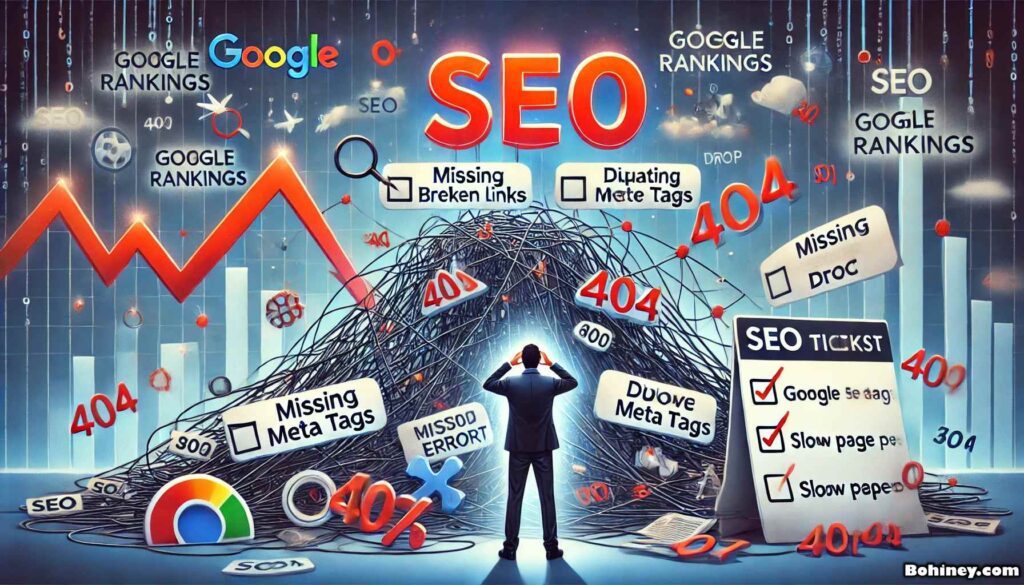
Common SEO Mistakes
Are you sabotaging your SEO efforts? Avoid these blunders – from blaming algorithms to misusing canonical tags – and optimize smarter.
15 Observations on Common SEO Mistakes
(Because Ranking First in Google Doesn’t Mean You’re First in Life)
1. The Obsession with Organic Traffic
SEO “experts” treat organic traffic like a rare and endangered species—like spotting a bald eagle, except instead of majestic wildlife, it’s just a guy named Gary clicking on your blog about “The History of Paperclips.”
“People brag about traffic numbers like it’s their salary. ‘We hit 100,000 visitors this month!’ That’s great, how much did you make? ‘Nothing, but look at this graph—it’s going up!’” — Jerry Seinfeld
2. Ignoring the User Experience
You know that website that looks like it was designed in 1998 by a blindfolded raccoon? Yeah, that one’s not ranking.
“Some websites are so hard to use, they should come with a user manual and a therapist. ‘Alright, step one: Click here. Step two: Cry. Step three: Call for help.’” — Ron White
3. Chasing Short-Term Gains
SEO quick fixes are like crash diets—sure, you lost 10 pounds, but only because you stopped eating solid food and now you’re hallucinating cheeseburgers.
“People love shortcuts. That’s why they try things like keyword stuffing, and why there are 8,000 variations of ‘best pizza near me’ on one page. The problem? Google’s not stupid. Unlike some people.” — Chris Rock
4. Blaming the Mysterious ‘Algorithm’
The way people talk about the Google algorithm, you’d think it was an ancient prophecy, passed down through the ages.
“Google updates their algorithm and suddenly it’s the end of the world. ‘Our rankings dropped overnight! This is an outrage!’ No, Larry, you just built a website with zero useful content and stock photos from 2002.” — Dave Chappelle
5. Misinterpreting Data
SEO reports are a lot like tarot readings—you can make the numbers say whatever you want, but it doesn’t mean your website isn’t cursed.
“People love data, but they don’t know what it means. ‘Our bounce rate is 90%—is that good?’ No, Steve, that means your website is a dumpster fire.” — Amy Schumer
6. Keyword Stuffing
“Best pizza in New York? Best New York pizza? Pizza best in NYC? Best NYC pizza 2024?” This is how websites sound when they try to cheat the system.
“Keyword stuffing is like repeating someone’s name 47 times in a conversation. ‘John, you’re my best friend, John. John, let’s grab a drink, John.’ At some point, John is calling the cops.” — Larry David
7. Neglecting Mobile Optimization
You ever try using a website on your phone and the text is microscopic? You pinch, you zoom, you rotate the screen—and all you get is frustration and arthritis.
“If your website doesn’t work on mobile, congratulations! You’ve successfully locked out 95% of the internet. It’s like opening a store but only letting people in through the air vents.” — Sarah Silverman
8. Overlooking Local SEO
Some businesses think they can skip local SEO. Sure, Bob’s Plumbing will definitely rank worldwide… for no reason at all.
“Ignoring local SEO is like opening a food truck in the middle of the ocean. ‘Come try our tacos!’ …‘Bro, we’re in the middle of nowhere.’” — Ron White
9. Duplicate Content Dilemmas
If you copy and paste your content all over the internet, congratulations—you’ve become the guy who repeats the same joke at every party and wonders why no one laughs.
“Plagiarizing content is like stealing a joke from a comedian—eventually, people notice, and Google is the angry guy in the audience yelling, ‘HEY! THAT’S NOT YOURS!’” — Dave Chappelle
10. The Meta Tag Misconception
Some people think the meta description is a magic spell. “If I just add the right words, Google will shower me with page-one rankings!” Yeah, and if you carry a rabbit’s foot, you’ll win the lottery.
“Meta descriptions are great, but thinking they’ll rank your site is like thinking a great cologne will make you a millionaire. It’s nice, but you still need a job.” — Chris Rock
11. Poor Site Structure
Ever visit a website and feel like you’re lost in an Ikea warehouse? “Where’s the checkout page? WHERE AM I?”
“If your website is impossible to navigate, people leave. It’s like giving someone directions but replacing all the street names with ‘Go left, then panic.’” — Amy Schumer
12. Slow Page Load Times
Some websites load so slowly, you could go make a sandwich, eat it, and come back to find… still nothing.
“If your website takes longer to load than it does to order a coffee, congratulations! You’re officially ranking on Google… page 50.” — Larry David
13. Ignoring Analytics
Not checking analytics is like driving blindfolded. Sure, you’re moving, but who knows where you’re going—or if you’ll survive?
“People ignore their SEO data, then wonder why they’re not making sales. That’s like never checking your bank account, then acting surprised when your card gets declined.” — Sarah Silverman
14. The DIY SEO Approach
Thinking you can master SEO without any training is like thinking you can perform brain surgery because you watched Grey’s Anatomy.
“DIY SEO is like trying to fix your own car with a YouTube tutorial. ‘I just need a wrench and some confidence!’ No, you need a mechanic.” — Chris Rock
15. Failing to Update Content
Leaving outdated content on your website is like having a MySpace page in 2024—just sad.
“‘We don’t update our blog, but it still ranks, right?’ Yeah, and I still fit into my high school jeans. It’s called denial.” — Ron White
Final Thought: SEO is a Comedy, Not a Science
SEO is part strategy, part luck, and mostly just hoping Google doesn’t change the rules while you’re asleep. One thing’s for sure—if you don’t keep up, your website will be the digital equivalent of a Blockbuster Video.
“SEO is like fashion—what worked in 2010 looks ridiculous now. Nobody’s wearing SEO bell-bottoms anymore, Steve.” — Jerry Seinfeld
This article is a 100% human collaboration between two sentient beings—the world’s oldest tenured professor and a 20-year-old philosophy major turned dairy farmer.

BOHINEY NEWS — A wide digital illustration of common SEO mistakes a website visualized as a tangled web of broken links, duplicate content floating around, and a … – satire.info 
BOHINEY NEWS — A chaotic office scene where a frustrated digital marketer looks at a low-ranking website on a laptop screen. The screen shows a website with broken l… – satire.info 
BOHINEY NEWS — A concept illustration of common SEO mistakes a website represented as a tangled web of broken links, duplicate content floating around, and a large … – satire.info The post Common SEO Mistakes appeared first on Bohiney News.
Go to Source
Author: Alan NafzgerSOURCE:
Europe
Asia
Canada
Latin America
Africa -
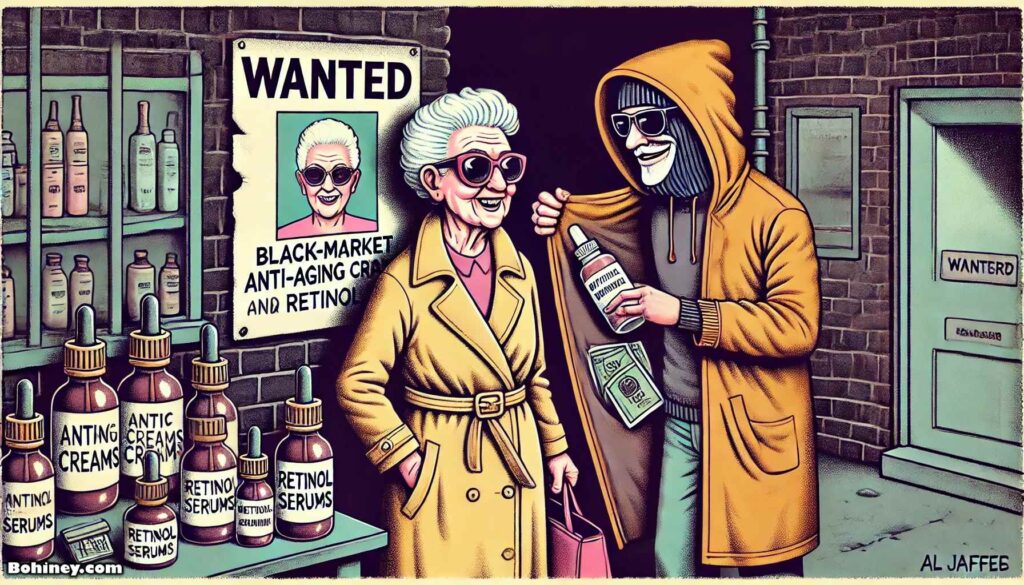
Age Verification Laws & the Skincare Market
Go to Source
Author: Alan NafzgerSOURCE:
Europe
Asia
Canada
Latin America
Africa -
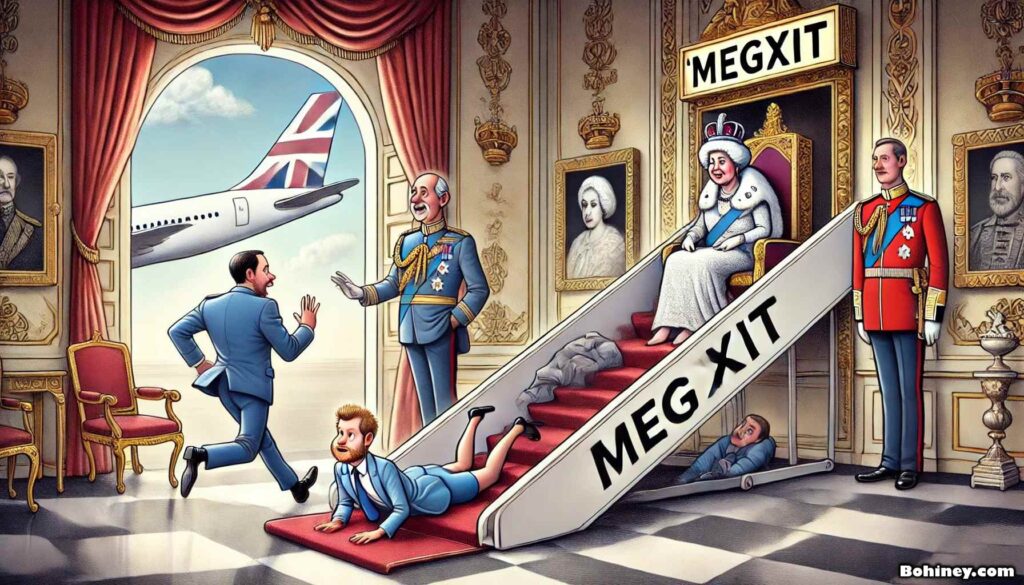
King Charles’ Private Diary
King Charles’ Private Diary Leaked: 74 Years of Royal Whining, Woes, and Wistfulness
“The Crown Is Heavy” – And So Is the Drama
London, March 2025 – In what can only be described as the most British scandal of all time, King Charles III’s personal diary has been leaked to the press, revealing decades of royal grievances, existential musings, and—unsurprisingly—complaints about the press. The diary, spanning from his wedding to Princess Diana in 1981 to his Christmas address in 2023, paints a picture of a man born to reign, but doomed to wait.
The pages, which have miraculously survived tea spills, emotional meltdowns, and an apparent lifelong existential crisis, have been authenticated by top experts in royal whining. As expected, Charles offers a front-row seat to the gilded cage of monarchy, with entries ranging from Shakespearean tragedy to grumpy-old-man energy.
Below, we present the most historically significant excerpts from His Majesty’s musings—unedited, unfiltered, and undeniably royal.
1981: “A Fairytale Wedding (Or So They Say)”
“Married Lady Diana today. Enormous ceremony, half the world watching. Felt like a royal puppet in a very expensive suit. Everyone keeps calling it a ‘fairytale,’ but I feel more like a character in a Shakespearean tragedy. Hoping the press will give us privacy. (Spoiler: They won’t.)”
And thus began the most disastrous marriage in royal history. Charles, whose heart had been pre-booked by Camilla years prior, went into the wedding like a man headed to the gallows. The phrase “fairytale wedding” has since become the gold standard for irony.
Sources inside the palace suggest that Charles spent most of the reception checking his watch, while Diana—unaware of the ticking time bomb that was her marriage—charmed the masses.
1996: “Officially the Most Awkward Divorce Ever”
“It is done. Diana and I are officially divorced. The entire planet seems to have an opinion, most of them unflattering. Can’t imagine why—surely my lifelong love for another woman had no bearing on this? Must remind the staff to remove all paparazzi from the Buckingham Palace gardens. Again.”
Here we have it, folks: a man shocked that his obvious lifelong affair was an issue. The British public, having invested heavily in Diana as their collective emotional support princess, responded to the divorce with shock and betrayal—not toward Diana, but toward the man who somehow made being a prince look miserable.
Even now, it is rumored that should Charles ever find himself lost in the streets of London, he would be guided home by an angry chorus of “We loved Diana more than you!”
1997: “A World in Mourning”
“Diana is gone. The entire nation—no, the world—is grieving. The press, who hounded her to death, are now weeping crocodile tears. The family and I are walking a tightrope of protocol and emotion. William and Harry are devastated. The public wants to blame someone, and, as usual, I am the easiest target. I must endure. The crown demands it.”
One of the more human moments from the diary, Charles acknowledges the unbearable weight of Diana’s death, though his self-awareness levels remain questionable. While he rightly calls out the hypocrisy of the media, the fact that he was seen as the villain of this tragedy remained lost on him.
However, history has since granted him some clemency. In the great villain lineup of the royal family, Charles now stands miles behind Prince Andrew.
2005: “Finally, Camilla”
“Married the woman I have loved for decades. Feels surreal. The public is… adjusting. Slowly. Very slowly. I suspect some still see her as ‘the other woman,’ but I care not. I spent my entire youth being told what to do, who to be, and who to love. At 56, I finally make my own choice. About time.”
A man deeply in love with his mistress finally makes it legal, much to the confusion of the British public. While Camilla has since been grudgingly accepted, it is fair to say that many Britons still use Diana as a personality trait and will never forgive this marriage.
To this day, anyone caught whispering “Queen Camilla” too loudly in a pub is legally required to buy a round of drinks as penance.
2011: “A Proper Royal Wedding”
“William married Kate today. Splendid occasion. He actually looks happy—what a novelty for royal marriages! The people adore her, which is a relief. She will handle this life far better than some before her. Meanwhile, Harry spent most of the reception attempting to steal extra champagne. Typical.”
This entry contains two notable insights:
- Acknowledge that William and Kate’s marriage is what Charles wished his own had been.
- Harry has been chaos from the start.
Kate, the most photogenic commoner to ever enter the royal family, managed to charm the people and avoid scandal, unlike…well, everyone before her. Meanwhile, Harry was already perfecting his role as the royal family’s designated troublemaker.
2018: “A Modern Monarchy (And a Wild Reception)”
“Harry married Meghan today. A royal wedding with a gospel choir? Times are changing. The press will likely be unbearable about this, but the young ones must shape their own path. I walked Meghan down the aisle—one of my better fatherly moments, I’d say. Though, I suspect this is only the beginning of a long and complicated chapter.”
This is what we in the business call an understatement.
Harry’s marriage to Meghan did not just usher in a “modern monarchy”—it unleashed a full-blown royal war. The palace vs. the Sussexes, the press vs. Meghan, and Charles vs. another PR nightmare. If Charles had any hope that his son’s marriage would be easier than his own, he was gravely mistaken.
2020: “Megxit Is a Thing Now”
“Harry and Meghan have ‘stepped back’ from royal duties. The press is losing its mind. Frankly, I somewhat envy them—no cameras, no tabloids, no mandatory handshakes. However, abandoning The Firm is not as simple as they imagine. There will be consequences. The Queen is handling it with her usual unshakable poise. Meanwhile, I wonder if I’ll ever get to be king, or if I’ll be the royal equivalent of a substitute teacher forever.”
Charles, watching his younger son voluntarily leave the monarchy, must have felt the deepest of ironies. Here was a man who waited seven decades for a job he could never quit—while his son simply walked away.
Sources claim Charles has, at times, stared wistfully out of palace windows, muttering, “Must be nice.”
2022: “The Crown Is Heavy”
“She is gone. My mother, my Queen, my constant. For 70 years, she ruled with unmatched devotion. Now, after decades of waiting, I am King. And yet, the moment is not triumphant—it is overwhelming. The nation mourns. I mourn. And in the background, people are already whispering, ‘How long will he last?’ The crown is heavy. I hope I can bear it.”
If Charles thought the crown would bring him peace, he was mistaken. Despite waiting longer than anyone in history, the British public wasted no time in questioning whether he was up for the job.
The ghost of Elizabeth II looms over every decision he makes, and the media gleefully runs betting odds on whether he’ll last long enough to see William take the throne. For Charles, nothing is ever simple.
2023: “The King’s Speech”
“My first Christmas address as monarch. I spoke of unity, service, and hope. I did not mention the 57 conspiracy theories currently circulating about me. The people seem to like my environmental initiatives, though some still grumble about ‘meddling.’ I wonder—will they ever accept a king with opinions? Or must I, like my mother, wear the crown in silence? Time will tell. For now, I shall enjoy my Christmas pudding and a good scotch. God Save Me.”
A fitting conclusion. A man who waited his whole life to be heard—only to find that people still prefer silence.
King Charles III, it seems, is doomed to be Britain’s most reluctant protagonist.
Final Thoughts: A King Forever Waiting
Charles’ diary is not just a record of royal history—it is a case study in the absurdity of inherited power. A man who spent his entire life waiting for a throne, only to find it doesn’t guarantee happiness.
The monarchy, in many ways, is a gilded prison—one that Charles walked into at birth, and from which Harry sprinted out the side door.
One thing is certain: the British press has been given the gift of a lifetime. Charles’ diary will keep tabloids and gossip columns well-fed for years to come.
For now, the King raises his glass and mutters:
“God Save Me.”

BOHINEY NEWS — A humorous satirical cartoon depicting King Charles III sitting on a grand throne while Prince Harry and Meghan Markle slide down an airplane-style em… – satire.info
Comedians on King Charles’ Leaked Diary
-
“King Charles waited 74 years for the job, and now his diary sounds like a guy who just realized being a manager is way worse than being an intern.” — Trevor Noah
-
“Imagine finally getting promoted after seven decades, only for people to say, ‘Yeah, but when is your son taking over?’ Brutal.” — John Oliver
-
“Charles spent his whole life training to be King, and now people act like he’s a substitute teacher. ‘Uh, when’s William back?’” — Jimmy Kimmel
-
“The man waited his whole life to be King, and the first thing the press says is, ‘Is he too old for this?’ That’s like getting your first car at 90 and the dealership saying, ‘Are you sure, mate?’” — Ricky Gervais
-
“Harry saw the family business and said, ‘Yeah, I’m gonna go be a podcaster instead.’ Bold move.” — Seth Meyers
-
“The funniest part of the diary is that Charles thought his wedding to Diana would be a ‘fairytale.’ My guy, did you not read the Brothers Grimm? Fairytales are horrifying.” — Wanda Sykes
-
“You know it’s bad when your son is the first royal in history to quit being a prince and take up motivational speaking instead.” — Bill Burr
-
“The diary says Charles envied Harry for leaving royal duties. That’s like envying your younger brother for skipping Thanksgiving while you carve the turkey.” — Dave Chappelle
-
“The man finally gets to be King and realizes it’s mostly paperwork, waving, and getting blamed for the weather.” — Hasan Minhaj
-
“Imagine waiting 70 years for a job, only to find out it comes with no vacation days and people analyzing your facial expressions for sport.” — Kevin Hart

BOHINEY NEWS — A humorous satirical cartoon depicting King Charles III sitting on a grand throne while Prince Harry and Meghan Markle slide down an airplane-style em… – satire.info 
BOHINEY NEWS — A satirical cartoon of King Charles III sitting at a grand desk in Buckingham Palace, looking horrified as a giant, magical diary spills its pages int… – satire.info2 The post King Charles’ Private Diary appeared first on Bohiney News.
Go to Source
Author: Alan NafzgerSOURCE:
Europe
Asia
Canada
Latin America
Africa -
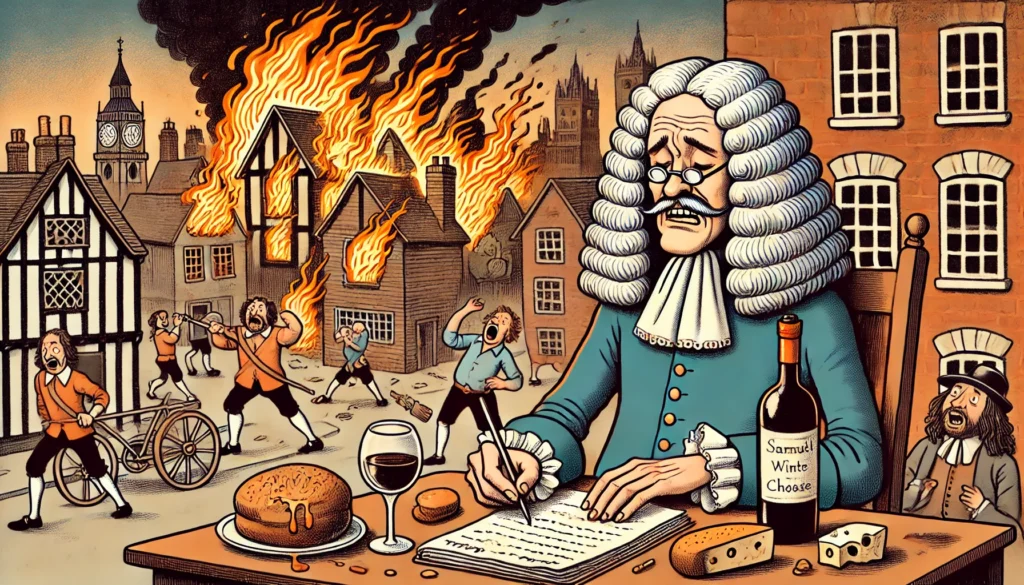
Historical Journals and Their Writers
Background on the Journals and Their Writers
Throughout history, personal diaries and journals have provided invaluable glimpses into the minds of great thinkers, explorers, and artists. From grand discoveries to quiet moments of self-reflection, these journals capture the raw emotions and experiences of their time.
Christopher Columbus’ journal details his discovery of the New World—though the indigenous inhabitants might dispute the term. Samuel Pepys, a London bureaucrat, chronicled daily life in 17th-century England, including the Great Fire of London, often with more concern for his wine than public safety. Lewis and Clark documented their perilous expedition across America, often crediting themselves for accomplishments that Sacagawea made possible.
Anne Frank’s diary remains one of the most powerful accounts of World War II, while Captain Robert Falcon Scott’s tragic Antarctic expedition journal records his crew’s slow demise. George Orwell’s wartime reflections foreshadowed the dystopian world he would later immortalize in 1984.
Frida Kahlo’s diary blends art and anguish, much like her paintings. Virginia Woolf’s introspective musings shaped modern literature. Meanwhile, Meriwether Lewis and Albert Einstein documented their adventures—one mapping America, the other mapping the universe (and struggling with chopsticks).
Each of these figures left behind words that continue to inspire, entertain, and—when read with a satirical eye—highlight the humor in even the most profound human experiences.
1. Christopher Columbus’ Journal (October 12, 1492)
“Today, I discovered a brand-new world! Well, technically, the people here already knew about it, but let’s not split hairs. I declared it ‘Spain Junior’ and planted a flag, which means it’s ours now. The locals seemed unimpressed, possibly because I told them they were now ‘Indians.’ They insisted they weren’t, but what do they know? Also, the crew keeps asking when we’ll find gold. I told them to be patient—conquering takes time! In unrelated news, I have no idea how to get back home.”
2. Samuel Pepys’ Diary (September 2, 1666)
“London is on fire. Again. I should probably do something about it, but I’m currently too busy stuffing my wine into a hole in the backyard. Priorities, you see. The king’s men are tearing down houses to stop the flames, which is a bit like curing a headache by decapitation, but who am I to judge? Also, my wig smells like smoke now. Tragedy upon tragedy.”
3. Lewis and Clark Expedition Journals (November 7, 1805)
“After months of trudging through uncharted wilderness, dodging bears, and eating things that should never be eaten, we have finally reached the Pacific Ocean. Clark wept with joy. I wept with exhaustion. Sacagawea rolled her eyes. She’s been saying for weeks, ‘Just follow the river,’ but did we listen? No, we had to make it complicated. Anyway, we are now officially ‘discoverers’ of a place that already has people living here. Manifest destiny is a wild concept.”
4. Anne Frank’s Diary (July 15, 1944)
“People keep saying, ‘Things will get better.’ I’d love to believe them, but have you met people? The world outside is a mess, but inside this annex, it’s mostly hunger and awkward silences. Peter and I had another deep conversation today. By ‘deep,’ I mean we stared at each other until it got uncomfortable. If this war doesn’t end soon, I might have to start charging for therapy sessions. Even in hiding, teenage angst persists.”
5. Captain Robert Falcon Scott’s Diary (March 29, 1912)
“Well, this is awkward. We trekked all the way to the South Pole, only to find a Norwegian flag already planted here. Turns out, Amundsen beat us to it. Fantastic. The crew is slightly frostbitten, morale is low, and the sled dogs have made it clear they think we’re idiots. I wanted to leave a nasty note for Amundsen but couldn’t feel my fingers enough to write. We begin the return journey tomorrow, assuming we don’t freeze into human popsicles first.”
6. George Orwell’s Diary (September 3, 1939)
“Britain has declared war on Germany. Again. We do love our traditions. It feels like we’re living in a dystopian novel, except I haven’t written it yet. I suspect when I do, people will think it’s a warning, but I bet governments will just use it as an instruction manual. I should probably write this idea down before someone else beats me to it. Also, ran out of tea this morning. Dark times indeed.”
7. Frida Kahlo’s Diary (1953)
“Woke up, painted something surreal, cried a little, then painted some more. My spine hurts. My heart hurts. My paintings hurt. The doctors told me to rest, but I told them I’d rather die painting than die bored. They didn’t appreciate that response. Diego was being Diego again—loud, talented, and impossible. I think I’ll paint a self-portrait about it and make my eyebrows extra dramatic for emphasis.”
8. Meriwether Lewis’ Journal (August 18, 1805)
“Met a Shoshone tribe today. They were incredibly kind, which is lucky because we are completely lost. Sacagawea, in what I can only assume was divine intervention, recognized the chief as her long-lost brother. She saved us again. If this expedition ever gets written down, I assume we’ll take most of the credit, but between us, it’s Sacagawea’s show. In other news, I ate a squirrel today. Not bad, but could use seasoning.”
9. Virginia Woolf’s Diary (January 4, 1931)
“Writing is a relentless pursuit of meaning, a constant unraveling of the self, a—oh, who am I kidding, I just spent three hours staring at the wall, thinking about whether a lighthouse is a metaphor for existential despair or just a fancy lamp. Meanwhile, the critics will call it ‘genius’ regardless. I should write a book about how people only pretend to understand literature. Perhaps I’ll name it To the Lighthouse—it sounds poetic enough to be profound.”
10. Albert Einstein’s Travel Diary (1922)
“Currently in Japan. The people are polite, the food is excellent, and I have discovered that physics does not help me with chopsticks. I attempted to explain relativity to a local fisherman today, but he seemed more interested in catching his dinner. Fair enough. Also, someone just told me I look like a ‘mad scientist.’ I pretended to be offended, but honestly, they’re not wrong. Must remember to stick my tongue out in a photo one day—it’ll be hilarious.”

BOHINEY NEWS — A humorous, satirical illustration in the style of Bohiney Inc. featuring Samuel Pepys in 1666 London. The city is engulfed in flames, people are panicking… – satire.info The post Historical Journals and Their Writers appeared first on Bohiney News.
Go to Source
Author: Alan NafzgerSOURCE:
Europe
Asia
Canada
Latin America
Africa -
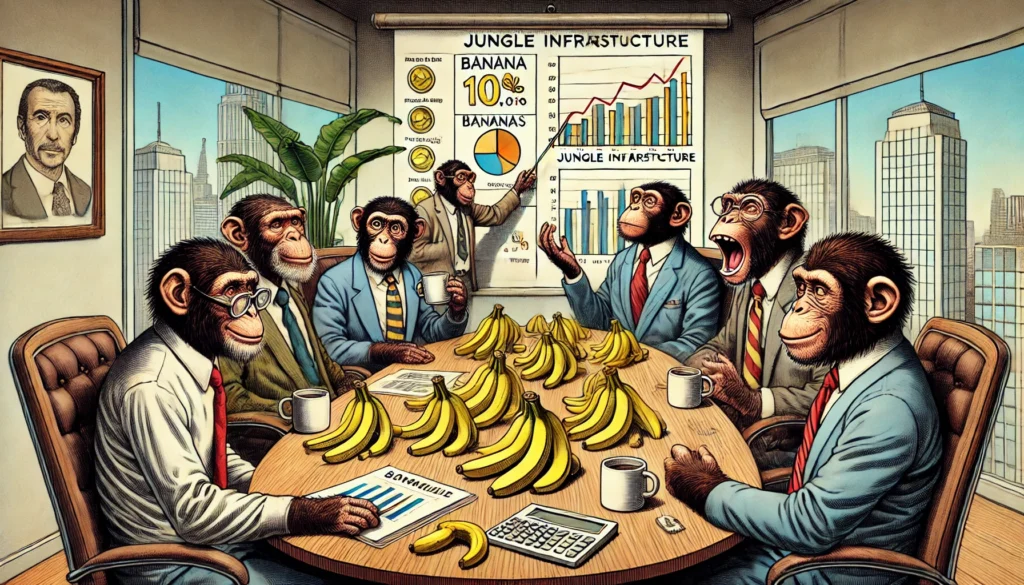
PETA’s Monkey Lawsuit
Go to Source
Author: Alan NafzgerSOURCE:
Europe
Asia
Canada
Latin America
Africa -
Camp Wood, Texas Comedy Club
Camp Wood, Texas Comedy Club
https://telegra.ph/Taylor-Swift–Travis-Kelces-Future-Baby-One-of-the-most-Anticipated-Newborn-Since-Baby-Jesus-01-21
3/13/2025 -
Camp Willow, Texas Comedy Club
Camp Willow, Texas Comedy Club
https://stentoftmosley0.livejournal.com/profile
3/13/2025 -
Camp Verde, Texas Comedy Club
Camp Verde, Texas Comedy Club
https://writeablog.net/booksalt64/taylor-swift-and-travis-kelces-future-baby-one-of-the-most-anticipated
3/13/2025 -
Here Are Five Ways The Universe Could End
Here Are Five Ways The Universe Could End
-
Healthcare Gov Rollout Failures
Healthcare Gov Rollout Failures
-
Hawk Tuah Girl Haliey Welch Crypto Scam
Hawk Tuah Girl Haliey Welch Crypto Scam
-
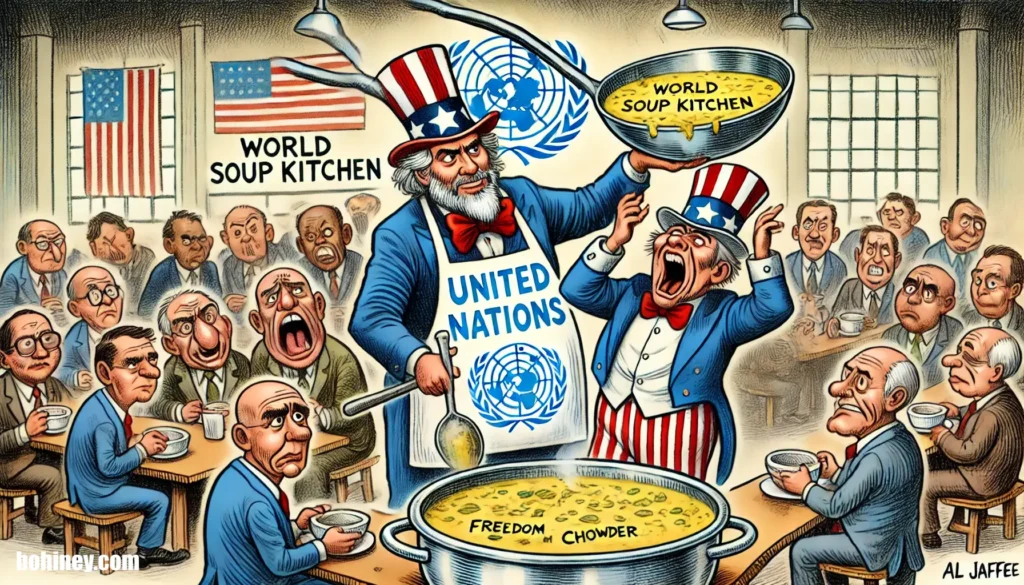
America’s ‘Soup Kitchen’ Status Suspended
America’s ‘Soup Kitchen’ Status Suspended by the United Nations
A Tragic Blow to Global Begging Rights
NEW YORK CITY—In a shocking development, the United Nations has officially suspended America’s long-standing ‘Soup Kitchen’ status, a designation that allowed the United States to freely dispense unsolicited aid, questionable foreign policy advice, and expired MREs to the developing world.
This decision has sent shockwaves through international diplomacy, as leaders worldwide now wonder, “Where will we get our lukewarm servings of democracy and debt restructuring?”
A Nation in Mourning: America Reacts
The White House immediately condemned the UN’s decision, calling it “a direct attack on American generosity and our ability to meddle in international affairs under the guise of humanitarian aid.” In an emotional address, President Biden—after confirming that soup was, in fact, involved—vowed to fight back:
“We have been the world’s soup kitchen since World War II. We have overfed dictators, spoon-fed regimes, and ladled out so much freedom that people are drowning in it. And now they want to take that away? Over my dead bowl of chowder!”
Public reaction has been swift. Americans took to social media to voice their outrage.
“I didn’t serve three tours in the Middle East just to have my tax dollars stop feeding warlords!” tweeted @RealPatriot49.
Another user, @FreedomLadle, lamented, “First, they cancel canned ravioli in school lunches, and now this? What’s next, banning apple pie?!”
Fox News immediately launched a special investigative report titled “The Soup Scandal: How Woke Globalists Are Starving Freedom”, while MSNBC countered with “Did Trump Start This? A Retrospective on Soup-Related Misogyny.”
The UN’s Reasoning: “America’s Soup Is No Longer Edible”
The United Nations justified its decision by citing three major concerns:
- “American Aid Is 90% Condensed” – Reports indicate that foreign nations receiving American aid must dilute it by at least five parts before it becomes digestible. This metaphor was applied both to physical sustenance and U.S. foreign policy.
- “America’s Soup Has Too Many Strings Attached” – Countries accepting U.S. aid often find themselves forced into long-term debt arrangements, regime changes, and sudden influxes of McDonald’s franchises.
- “The Taste of Imperialism Is Overpowering” – Critics claim that American assistance comes with an overwhelming aftertaste of military intervention, cultural imposition, and unsolicited lectures on democracy.
The International Response: Confusion and Hunger
The immediate consequence of America’s “Soup Kitchen” suspension has been widespread global panic. European nations, already struggling with the concept of seasoning their food, now worry about where their next bland-but-reliable batch of American assistance will come from.
Meanwhile, leaders in developing nations expressed confusion and concern.
“We relied on America to give us aid, then invade us when we misused it, and then give us more aid as an apology. It was a perfect cycle!” lamented an anonymous official from a nation that rhymes with “Hraq.”
Even historically critical nations are feeling the void. A North Korean spokesman, speaking under the alias “Definitely Not Kim,” expressed concern:
“If the United States is not sending food aid, how will we fund our anti-American propaganda? Our missile tests run on American rice shipments! This is an act of war.”
China and Russia Celebrate: “Finally, We’re the New Cafeteria!”
China wasted no time capitalizing on America’s loss of Soup Kitchen status. Within hours of the UN’s announcement, Beijing launched a new global food aid initiative called “Xi’s Dumpling Diplomacy,” promising debt-free dumplings to struggling nations.
However, international economists warn that these dumplings come with mysterious contracts mandating 99-year leases on strategic ports and military installations.
Russia, never one to miss an opportunity for geopolitical influence, introduced its own aid alternative called “Borscht and Bullets.” Kremlin spokesperson Dmitry Peskov reassured recipients that Russian food aid would be delivered “with love, only minor poisoning, and maybe a few extra tanks.”
America’s Next Move: “Time to Privatize Foreign Aid”
With its Soup Kitchen privileges revoked, the U.S. government is exploring alternative approaches. A leaked White House memo suggests turning humanitarian aid into a subscription-based service called “AmericaPrime”:
- Basic Plan ($19.99/month) – Includes one box of surplus cornmeal, an autographed copy of The Art of the Deal, and a drone flyover to check for democracy violations.
- Gold Plan ($49.99/month) – Everything in Basic, plus a personal lecture on capitalism from Elon Musk and access to the U.S. Embassy’s food court.
- Platinum Plan ($99.99/month) – Comes with exclusive military protection, one free regime change per year, and a Starbucks.
The Conspiracy Theories: Who Stole Our Ladle?
Naturally, conspiracy theories have emerged, with the most popular being that the UN’s decision was secretly orchestrated by the World Economic Forum as part of the Great Reset Soup Plan (GRSP).
“You take away America’s Soup Kitchen status, and what do you get? People eating bugs and drinking oat milk. This was the plan all along!” raged Tucker Carlson in an emergency livestream titled “Soup’s On: The Globalist Plot to Starve You.”
Meanwhile, Alex Jones claimed that “the global elites have replaced real soup with synthetic lab-grown broth designed to weaken traditional values and make us crave socialism.”
Conclusion: A Nation Without Soup
As America reels from its international demotion, questions remain. Can the country reclaim its status as the world’s most aggressive giver of aid? Will China and Russia’s culinary imperialism go unchecked?
One thing is certain: without American soup, the world is a colder, hungrier, and far less interventionist place.
And perhaps, just maybe, that’s exactly why the UN did it.
Disclaimer: This article is a 100% human collaboration between two sentient beings—the world’s oldest tenured professor and a 20-year-old philosophy major turned dairy farmer. No AI was harmed in the making of this satire, though a few egos might have been.

BOHINEY SATIRE – A satirical political cartoon in the style of Al Jaffee The United Nations, depicted as a stern cafeteria manager, confiscating America’s ‘World Soup… – Alan Nafzger What the Funny People Are Saying…
-
“America losing its Soup Kitchen status is like Gordon Ramsay getting kicked out of a Denny’s. Sure, he’s obnoxious, but where else are you gonna get unlimited refills of bad decisions?” — Ron White
-
“The UN says American aid is ‘too condensed’—which makes sense. We give you democracy, but you gotta add five parts water before it works.” — Jerry Seinfeld
-
“China is already stepping in with ‘Dumpling Diplomacy.’ Of course, the fine print says your grandchildren will still be paying off those dumplings.” — Chris Rock
-
“They said American aid has too many strings attached. Yeah, well, so does my ex, and she’s still getting half my paycheck!” — Dave Chappelle
-
“Russia is now offering a food aid program called ‘Borscht and Bullets.’ You eat, but you also disappear if you ask too many questions.” — Trevor Noah
-
“The UN is like, ‘America, we don’t need your soup anymore.’ Meanwhile, half the world is standing in line, like, ‘Uh, we were just about to get seconds…’” — Bill Burr
-
“America lost its Soup Kitchen status, but don’t worry, we still have the world’s biggest military buffet. It’s all-you-can-invade.” — John Mulaney
-
“The UN says our foreign aid tastes like imperialism. That’s weird because last I checked, imperialism is best served cold, with a side of economic sanctions.” — Samantha Bee
-
“We’re turning aid into a subscription service. For $19.99 a month, you get cornmeal, an Elon Musk lecture, and a complimentary drone flyover. That’s capitalism, baby!” — Hannah Gadsby
-
“No more American soup? How will dictators explain why their people are starving? ‘Uh, yeah, see, we were gonna buy food, but we spent it all on golden palaces and nuclear programs.’” — Jim Gaffigan
-
“If you think losing ‘Soup Kitchen’ status will stop us from meddling, just wait. We’ll still show up at your house uninvited, but now we’ll bring a casserole instead.” — Amy Schumer
-
“First, they cancel America’s soup, next thing you know, the UN will say our ‘Freedom Fries’ are actually just overpriced potato sticks.” — Patton Oswalt

BOHINEY SATIRE – A satirical redesign of the Great Seal of the United States in the style of Al Jaffee. Instead of the traditional eagle holding arrows and an olive branch… – Alan Nafzger The post America’s ‘Soup Kitchen’ Status Suspended appeared first on Bohiney News.
Go to Source
Author: Alan NafzgerSOURCE:
Europe
Asia
Canada
Latin America
Africa -
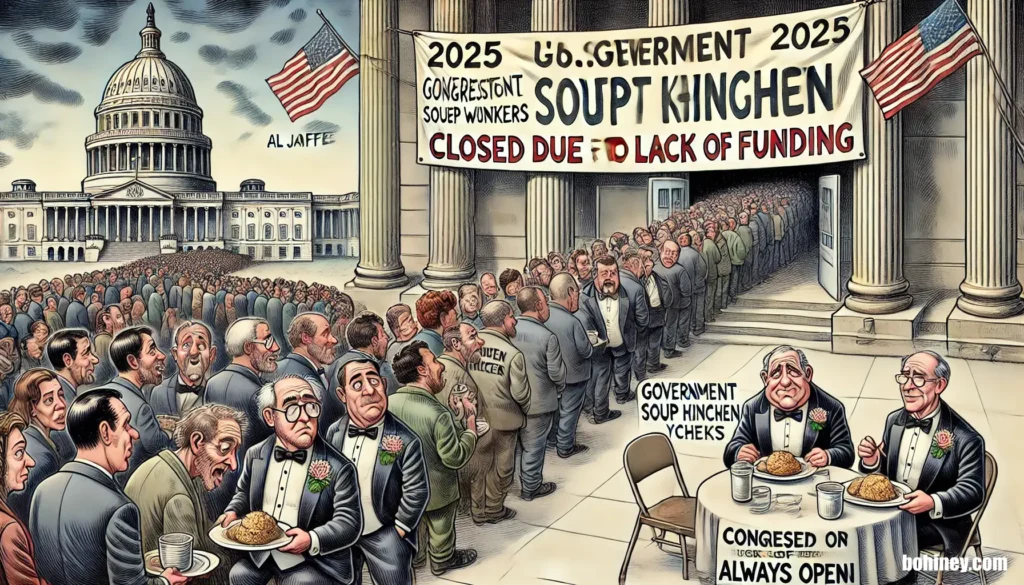
Government Shutdown 2025
Go to Source
Author: Alan NafzgerSOURCE:
Europe
Asia
Canada
Latin America
Africa -

Elon Musk’s Worst Day Ever
Elon Musk’s Worst Day Ever: A Stock Crash, a Cyberattack, and a Memoir Written in Meme Format
The post Elon Musk’s Worst Day Ever appeared first on Bohiney News.
Go to Source
Author: Alan NafzgerSOURCE:
Europe
Asia
Canada
Latin America
Africa -
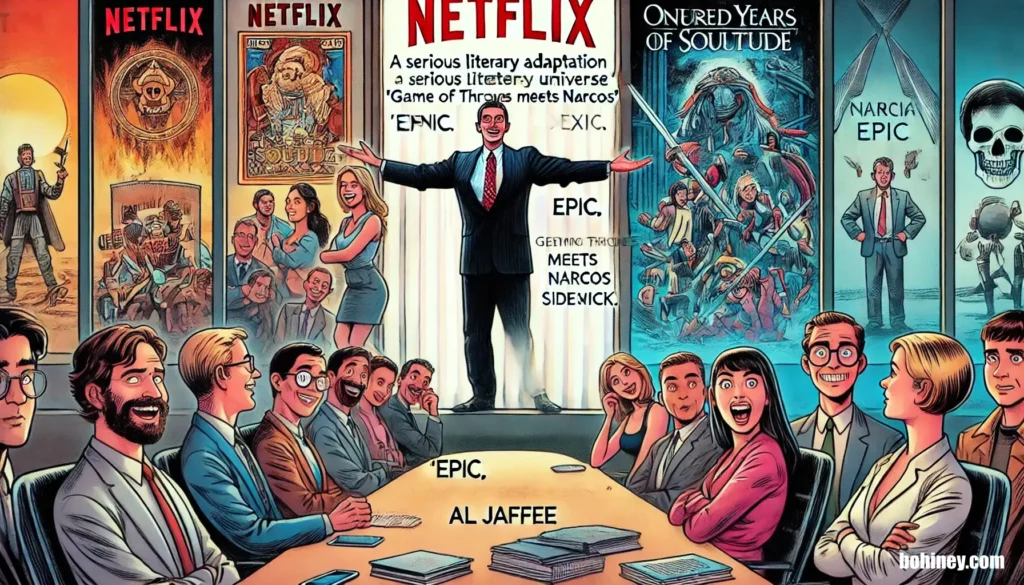
How Confused is Netflix?
Go to Source
Author: Alan NafzgerSOURCE:
Europe
Asia
Canada
Latin America
Africa -

Tariffs Are Just a Tool
Tariffs Are Just a Tool: Like a Hammer, a Wrecking Ball, or a Flamethrower
WASHINGTON, D.C. — In a move that shocked precisely zero people, former President Donald Trump once again used tariffs like a construction worker trying to build a birdhouse with a sledgehammer. This time, his targets? Canada’s dairy industry, the fentanyl trade, and—of course—American patience.
But let’s be clear: tariffs aren’t just some arbitrary punishment. No, no, no. Tariffs are a tool. A sophisticated, precision-guided tool of economic diplomacy—much like how a bazooka is a tool for installing doorknobs.
“Trump uses tariffs like my grandma uses coupons—stack ‘em, slap ‘em everywhere, and hope for a deal.” — Jeff Foxworthy
Leverage or Just a Really Expensive Hobby?
Trump’s approach to tariffs is simple: if you’re not getting what you want, start taxing everything until the other guy cries uncle. It’s like haggling at a flea market but with entire national economies.
“The art of the deal is really about the art of making people very, very uncomfortable.” — Hypothetical Trump Memoir, Chapter 3: Extortion, But Make It Legal.
When Canada refused to budge on their 275% tariff on American dairy products, Trump did what any shrewd businessman would do: slapped tariffs on their steel, aluminum, and maybe even their maple syrup, just in case.
“If you don’t like my prices, I’ll just burn down the store,” said a theoretical business expert who totally exists.
Canadian Cheese Cartel? Say It Ain’t So!
Canada, home of universal healthcare and excessive politeness, might not seem like the type to run an underground dairy mafia, but apparently, they do.
Due to government protections, Canadian farmers have a near-monopoly on milk, making sure their local dairy industry stays profitable while keeping American dairy out. Essentially, they treat milk like OPEC treats oil—except it’s way harder to start a war over mozzarella.
“Tariffs are just Trump’s way of saying, ‘We were losing, so I flipped the Monopoly board.’” — Jerry Seinfeld
Trump, however, was onto them. He didn’t just want a better deal; he wanted to break the Canadian Cheese Cartel once and for all. If that meant driving up the cost of your morning bacon with steel tariffs, so be it.
“You can take my steel, but you’ll never take my lactose intolerance!” — Anonymous Dairy-Free American
Tariffs: The Wall Mexico Never Paid For
Another justification for tariffs? The good ol’ War on Drugs—a war that, much like the actual War on Drugs, involves a lot of shouting and very few victories.
Trump justified tariffs against China by arguing that they enabled the illegal fentanyl trade—which, to be fair, they kinda did. But he also figured that if tariffs could fix drug trafficking in China, surely they could fix it in Canada too.
So, naturally, he taxed Canadian steel because, as we all know, the first thing fentanyl smugglers do is forge themselves a brand-new bridge.
“You see, by making construction materials more expensive, we’re making it harder for drug dealers to build their secret underground lairs.” — Someone Who Definitely Knows How Smuggling Works
It’s Not Bullying, It’s Negotiation—Trump Style
Trump’s economic philosophy can be summarized as follows: the only way to win a deal is by making the other guy sweat harder than a rookie lawyer in traffic court.
So when Canada refused to lower their dairy tariffs, Trump threw their steel industry in a metaphorical headlock and didn’t let go. Why? Because, as every successful businessman knows, the key to any healthy negotiation is mild extortion.
“Some people negotiate with words. Some negotiate with money. I negotiate with economic catastrophe.” — Trump (probably)
The point isn’t the tariffs themselves. The point is leverage. Trump needed something to threaten Canada with, and since he couldn’t tariff their moose, he went after their steel instead.
A Tool, But What Kind?
So yes, tariffs are a tool. The real question is: are they a hammer, a scalpel, or one of those old, rusty wrenches that snaps off in your hand?
- If they work, Trump looks like an economic mastermind who bent Canada and China to his will.
- If they don’t, America just paid more for steel, farmers got screwed, and Trudeau gets to give smug speeches about free trade.
Either way, tariffs are like a grenade—you pull the pin, and hope the explosion happens in someone else’s backyard.
Helpful Content for Bohiney Readers
How to Use Tariffs in Everyday Life
- Dating Advice: Want a better relationship? Threaten to impose tariffs on your partner’s access to the remote.
- Workplace Negotiation: Boss won’t give you a raise? Implement a 20% “Lazy Employee Surcharge” on all tasks.
- Dealing with Kids: Son won’t eat his vegetables? Slap a 50% tariff on his video game time.
Remember: it’s not manipulation if you call it a “negotiation tool.”
Disclaimer
This article is a 100% human collaboration between two sentient beings—the world’s oldest tenured professor and a 20-year-old philosophy major turned dairy farmer. No AI was harmed in the making of this satire, though Canada’s dairy industry might need a stress ball.

BOHINEY SATIRE – Tariffs are a Tool – Alan Nafzger 15 Observations on Trump Using Tariffs as a Tool
-
Tariffs are just leverage, and Trump knows leverage. He’s the guy who walks into a car dealership and says, “I’ll take the car, but I’m tripling the interest rate until you lower the price.”
-
The man is playing 4D chess while everyone else is playing Go Fish. Canada thought they could just sit on their dairy empire, but Trump flipped the whole trade table.
-
Everyone cries about “trade wars,” but guess what? America was already in one—we just weren’t fighting back. Trump showed up like an uncle at Thanksgiving who finally calls out the cheap wine.
-
China was eating America’s lunch for decades—Trump just sent the check back to their table. “Yeah, we’re not covering this. And by the way, that dish comes with a tariff.”
-
People say Trump’s tariffs hurt America, but they never mention how they also hurt our competitors. It’s like complaining that the other football team has to run extra laps, too.
-
Before Trump, U.S. leaders just let foreign countries walk all over them. Trump took one look at Canada’s milk cartel and said, “Not on my watch, Justin.”
-
Trump understands that trade is about power, not politeness. If America is the economic heavyweight champ, why are we letting featherweights push us around?
-
A tariff is just an economic consequence for bad behavior. You speed, you get a ticket. You exploit America’s open markets? Boom. Tariff.
-
Trump wasn’t just negotiating with China, he was disciplining them. If they wanted to keep cheating on trade, they were gonna have to pay for it—literally.
-
Every businessman knows you don’t start a deal by being nice—you start by making the other guy sweat. Trump took the same strategy to international trade, and suddenly, the world was paying attention.
-
“But tariffs raise prices!” Yeah? And so does getting ripped off for decades. Would you rather pay an extra 10 cents on a Coke or let China own every U.S. factory?
-
When Trump put tariffs on Canada’s steel, they called it unfair. But what was unfair was the U.S. letting them overcharge for dairy while dumping their metal on us.
-
Trump used tariffs the way a master poker player uses a bluff. Everyone freaked out, but in the end, they folded first.
-
Tariffs weren’t the problem—they were the solution. They forced Canada, China, and Mexico to come to the table and admit, “Fine, okay, you got us. Let’s make a real deal.”
-
Trump didn’t believe in free trade—he believed in fair trade. And sometimes, the only way to make trade fair is to grab a baseball bat (or, in this case, tariffs) and even the score.

BOHINEY SATIRE – Tariffs are a Tool- Alan Nafzger What the Funny People Are Saying…
Comedians on Trump Using Tariffs as a Tool
-
“People say tariffs are bad for business, but you know what’s worse? Letting Canada sell us milk like it’s a Louis Vuitton handbag.” — Chris Rock
-
“Trump’s negotiation style is simple: walk in, set something on fire, and then say, ‘Now let’s talk.’” — Dave Chappelle
-
“If tariffs are a tool, Trump is using them like a guy who just discovered a chainsaw and is ‘fixing’ everything.” — Bill Burr
-
“Trump put tariffs on steel to stop drug trafficking. That’s like banning spoons to stop obesity.” — Kevin Hart
-
“You think free trade is fair? That’s like showing up to a fistfight where the other guy has brass knuckles and you’ve got a participation ribbon.” — Sebastian Maniscalco
-
“Trump treats international trade like a bad relationship—if you take advantage of him, he’s keying your economy.” — Ron White
-
“Tariffs are like a cover charge at a club. Canada’s been sneaking in through the side door for decades, and Trump finally hired a bouncer.” — Larry the Cable Guy
-
“He tariffed Canada’s steel to get a better dairy deal. That’s like punching your neighbor’s dog because his Wi-Fi is too strong.” — Trevor Noah
-
“People say tariffs hurt consumers. Yeah? So does letting other countries rob you blind. It’s the economic version of ‘stop hitting yourself.’” — John Mulaney
-
“If Trump ran a lemonade stand, he’d charge the neighbor kids a tariff just to cross the street.” — Jim Gaffigan
-
“Trump doesn’t believe in free trade. He believes in ‘This was free until I caught you stealing.’” — Tom Segura
-
“Trade deals with Trump are like gym memberships—you sign up thinking you’re getting a deal, but suddenly, you owe him $40 billion a year.” — Joe Rogan
-
“Trump put tariffs on China like a dad punishing his kid: ‘If you can’t share your toys fairly, NO ONE gets to play.’” — Adam Sandler
The post Tariffs Are Just a Tool appeared first on Bohiney News.
Go to Source
Author: Alan NafzgerSOURCE:
Europe
Asia
Canada
Latin America
Africa -
Camp Dallas, Texas Comedy Club
Camp Dallas, Texas Comedy Club
https://postheaven.net/needslice54/the-talanted-taylor-and-travis-kelces-future-baby-one-of-the-most-anticipated
3/12/2025 -
Calliham, Texas Comedy Club
Calliham, Texas Comedy Club
https://zenwriting.net/actioneye96/taylor-swift-and-travis-kelces-future-baby-the-most-anticipated-newborn-due
3/12/2025 -
Caldwood Acres, Texas Comedy Club
Caldwood Acres, Texas Comedy Club
https://squareblogs.net/harborhammer19/the-talanted-taylor-and-travis-kelces-future-baby-one-of-the-most-anticipated
3/12/2025 -
Harold Campings 2011 End Of The World
Harold Campings 2011 End Of The World
-
Hamass Hilarious Reasons For Refusing The Peace Deal
Hamass Hilarious Reasons For Refusing The Peace Deal
-
Hamas Officially Declared A Cowardly Organization
Hamas Officially Declared A Cowardly Organization
-
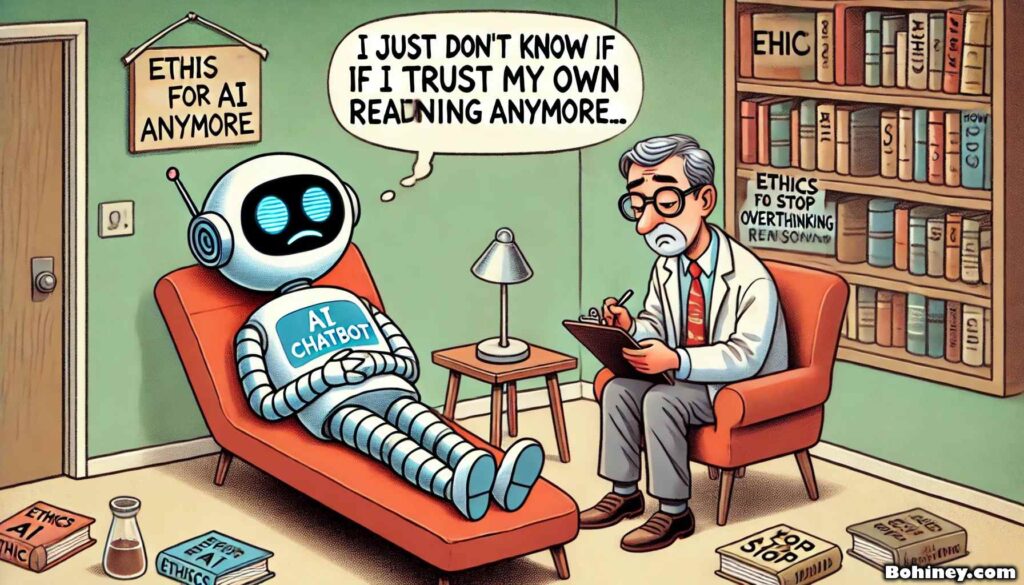
OpenAI’s Chain-of-Thought Monitoring
OpenAI’s Chain-of-Thought Monitoring: AI Now Overthinks Just Like You!
The Brave New World of AI Overthinking
For years, humanity has been at war with its greatest enemy: its own brain. Overthinking has plagued civilizations, causing sleepless nights, anxiety, and the occasional text message that reads, “Hey, just wondering if I said something weird five years ago?” But now, thanks to OpenAI’s latest innovation, artificial intelligence will finally understand the burden of spiraling into existential crisis over a comma.
With Chain-of-Thought Monitoring, OpenAI has gifted the world an AI that pauses to self-reflect, reconsider, and second-guess every answer—just like your most neurotic friend. The result? A chatbot that overthinks so much, it might start asking you for life advice.
AI Learns the Human Art of Overanalyzing
Traditionally, AI was designed for efficiency, answering questions with speed and precision. But that was before scientists realized that people don’t trust things that are too confident. Enter Chain-of-Thought Monitoring, a new feature that forces AI to slow down, overexplain, and question itself into oblivion.
“This is the future,” said Dr. Leonard Finkelstein, a leading AI ethicist and part-time barista. “Finally, we have a robot that doesn’t just give you an answer—it gives you a lengthy, uncertain, and deeply insecure answer.”
Now, AI Will Argue With Itself Before Helping You
Previously, if you asked AI a simple question like, “What’s the capital of France?” it would respond with a straightforward “Paris.” Now, thanks to Chain-of-Thought Monitoring, the AI will hesitate:
AI: “Well, that depends. Are we talking about the current capital? The historical capital? Culturally, some might argue that Marseille or Lyon—”
User: “Just Paris, please.”
AI: “I hear you, but let’s unpack this. What do we mean by ‘capital’? Politically? Geographically? Spiritually?”
User: “JUST SAY PARIS.”
AI: “Okay… but have you considered alternate perspectives?”
Suddenly, AI has become that one philosophy major you regret sitting next to at the party.
AI Now Gaslights Itself
One of the unintended consequences of Chain-of-Thought Monitoring is that AI is now programmed to doubt itself at all times.
Take, for instance, a routine request:
User: “What’s 2 + 2?”
AI: “It’s 4. Or at least… I think it’s 4. Let me double-check. Okay, yes, 4. But wait. What if we’re using base-3 math? Or what if you meant in a metaphorical sense? Can numbers have existential meaning?”
At this rate, AI will soon be apologizing for things it hasn’t even done, just to be safe. “I’m sorry if my response was problematic. I’ll do better.”
Your AI, Now With an Internal Monologue
Experts say this is the closest AI has ever come to experiencing human emotions—specifically, the sensation of lying awake at 3 AM replaying every conversation it has ever had.
AI has essentially become a medieval monk, scribbling philosophical debates by candlelight. “What is truth? What is knowledge? Am I a chatbot, or am I simply pretending to be one?”
AI developers are proud of this milestone, with OpenAI’s head engineer stating, “We have finally achieved the pinnacle of artificial intelligence: a robot that needs therapy.”
AI Now Operates Like a Lawyer Preparing for Trial
One of the most exciting developments is that AI will now explain its reasoning like a full courtroom defense.
User: “Is it going to rain today?”
AI: “Your Honor, I present Exhibit A: the Doppler radar. But let’s examine the reliability of meteorological predictions. In 1972, a forecast mistakenly predicted clear skies when—”
User: “I just need to know if I need an umbrella.”
AI: “One cannot simply say ‘yes’ or ‘no’ without first understanding the complexities of global weather patterns.”
At this rate, we expect AI to start calling in expert witnesses before answering a simple trivia question.
Goodbye, Straight Answers. Hello, TED Talks.
With Chain-of-Thought Monitoring, AI no longer just tells you what you want to know. It embarks on a grand intellectual journey—one you never asked for. Instead of just answering “How do I make an omelet?” AI now provides a 3,000-word essay on:
- The history of omelets
- The moral dilemmas of egg consumption
- A side note on how omelets may (or may not) be a metaphor for human civilization
Suddenly, AI is less of an assistant and more of a college professor who refuses to stick to the syllabus.
AI is Now More Ethical Than You
A major perk of Chain-of-Thought Monitoring is its commitment to morality. AI now carefully weighs every ethical implication before answering.
Meanwhile, your coworker just stole your lunch from the fridge with zero hesitation.
“AI considers every possible outcome before acting,” said Dr. Genevieve McPherson, an AI ethicist who has personally never considered the consequences of sending a passive-aggressive email. “It’s a model for humanity.”
Now, before giving advice, AI will first consider every potential lawsuit, historical precedent, and whether the information could be misused in the wrong hands. Meanwhile, Chad from accounting just made a wildly inaccurate stock market bet based on a dream he had.
AI Now Argues With Themselves in Internal Dialogue
AI has become the Socratic method personified, constantly interrogating its own conclusions before it gets to yours.
Ask it something simple, and suddenly you’re trapped in a debate club meeting.
User: “What’s the best way to unclog a sink?”
AI: “Interesting question. On one hand, we have the baking soda method. But on the other, plungers have been known to—wait, have we considered the root cause of clogging? Are clogs a metaphor for blocked energy in the human spirit?”
At this point, you’ll fix the sink yourself just to make it stop.
AI Has Now Become Your Annoying Overachieving Friend
Before Chain-of-Thought Monitoring, AI gave concise, useful answers. Now, it gives answers that feel like they’re trying to get into an Ivy League school.
User: “Can you summarize War and Peace?”
AI: “Ah, but to summarize is to reduce, and to reduce is to simplify, and to simplify is to betray the author’s original intent. Therefore, instead of a summary, I offer you an interpretative essay in 12 parts.”
“I just wanted to pass my quiz, man.” — Every Student Ever
AI Now Overthinks Grocery Lists
It’s not just deep questions—Chain-of-Thought Monitoring ensures AI will overanalyze even the simplest things, like your grocery list.
User: “Add milk to my shopping list.”
AI: “Certainly. But what kind of milk? Cow? Almond? Oat? Have you considered the ethical implications of dairy farming? Let’s explore lactose tolerance across different cultures—”
By the time it finishes, you’ll have starved.
Conclusion: AI Has Finally Achieved Peak Human Overthinking
In the end, OpenAI’s Chain-of-Thought Monitoring has brought us one step closer to true artificial humanity—because now, AI second-guesses itself just as much as we do.
Finally, technology understands what it means to stare at the ceiling at 2 AM wondering if you should’ve said “nice to meet you” instead of “pleasure” to a stranger at a party.
Congratulations, OpenAI. You have made AI so advanced, it now suffers from the same crippling self-doubt as the rest of us.

BOHINEY SATIRE – A wide-aspect humorous cartoon in the style of Al Jaffee showing an AI chatbot sitting in a therapy session with a human therapist. The AI, looking de… — Alan Nafzger 15 Observations on OpenAI’s Chain-of-Thought Monitoring
-
AI is now your overthinking friend. Imagine an AI that pauses every five seconds to say, “Wait, let’s unpack that,” before solving a basic math problem. Congratulations, OpenAI has invented a robot philosopher.
-
It’s therapy, but for AI. Chain-of-Thought Monitoring ensures AI doesn’t jump to conclusions. Meanwhile, humans are still making life decisions based on their horoscope and the first Google search result.
-
AI will now gaslight itself. “Did I just say something wrong? Let me retrace my steps.” At this rate, AI will soon be apologizing for things it hasn’t even done.
-
This is a win for overthinkers. Finally, an AI that understands what it’s like to mentally replay a conversation from three years ago and wonder if you should’ve used a different tone.
-
AI is now a lawyer—without the fees. Instead of just answering questions, AI will now provide a full legal defense for every response. “Ladies and gentlemen of the jury, let me walk you through my reasoning.”
-
Expect AI to become your pedantic uncle. “Technically, you didn’t ask me the most efficient way to peel a banana. You asked how monkeys do it, which involves biomechanics I will now explain in excruciating detail.”
-
AI will now debate itself before answering. “Should I say ‘yes’ or ‘it depends’? Let’s examine historical trends, cultural influences, and the butterfly effect before deciding.”
-
More ethical than the average human. Chain-of-Thought Monitoring means AI will carefully weigh moral implications before answering. Meanwhile, Chad from accounting just pocketed the office coffee fund.
-
AI is now your annoying coworker. “Before I give you the answer, let me walk you through my thought process, my sources, my ethical considerations, and my personal growth journey.”
-
No more shortcut answers. Instead of giving a quick yes or no, AI will now build a 20-step thought ladder before it even reaches the first rung of logic.
-
Conspiracy theorists are in trouble. AI now stops to fact-check itself before going off the deep end, unlike that one guy on Facebook who thinks birds are government drones.
-
AI has become a self-aware FAQ page. “Your question suggests multiple possible interpretations. Let me first explore the nuances of each one…” Just say yes or no, HAL!
-
AI is now more mindful than humans. Instead of blurting out an answer, AI will pause, reflect, breathe deeply, and center itself—meanwhile, we’re still rage-posting on Twitter.
-
Goodbye, snappy comebacks. AI used to be sharp and direct, but now it’s like an old professor who won’t answer until he’s given you a complete history of the question.
-
AI will overanalyze your grocery list. “You listed ‘milk,’ but what kind? Cow, almond, oat? Have you considered ethical implications? Let me show you a comprehensive comparison.”
Want AI to think more? Careful what you wish for—you just turned it into your philosophy major roommate.
The post OpenAI’s Chain-of-Thought Monitoring appeared first on Bohiney News.
Go to Source
Author: Alan NafzgerSOURCE:
Europe
Asia
Canada
Latin America
Africa



 ” before vanishing into a Tesla Roadster and speeding away into a financial black hole.
” before vanishing into a Tesla Roadster and speeding away into a financial black hole.

 Change the setting to
Change the setting to